#(the reference is that he's the first person cited in english to use the word sex to mean intercourse)
Text
Zelink Relationship in Breath of the Wild
In early 2022, I started playing Breath of the Wild and to this day, this game manages to win me over in a way I never imagined in a game of the franchise. One of the things that fascinates me about the game, beyond the whole world and exploration, is the relationship between Zelda and Link.

Notes:
This analysis is based on Zelda and Link's Diary cited in Breath of The Wild. Link's diary is quite subtle because, of the game's English translation but, I'll explain how it works.
In the game, there is a quest called "Captured Memories" where you have to go to various locations in Hyrule to recover your memories with Zelda from 100 years ago, which I will also use in the analysis.
The memories and the diaries in BOTW are crucial in deciphering the sentiment between Link and Zelda.
Part 1: Zelda's Feelings and Thoughts about Link
First Impressions of Link
First, let's talk about Zelda's feelings based on what we have in BotW. In BotW, precisely in Hyrule Castle, in Princess Zelda's room, it is possible to find Zelda's diary, where she expresses about how it was to meet the champions and about went to researched the ancient technology and below that she wrote "P.S. Tomorrow , my father is assigning HIM as my appointed knight..." and this "HIM", she refers to Link.
In the first memory of the game, we can see that Zelda wasn't happy with the idea of being followed and watched by Link.

Zelda also brings up the fact that Link spends most of his time in silence, writing this in his diary:
"And still, not a word passes his lips. I never know what he's thinking! It makes my imagination run wild, guessing at what he is thinking but will not say. What does the boy chosen by the sword that seals the darkness think of me? Will I ever truly know? Then, I suppose it's simple. A daughter of Hyrule's Royal family yet unable to use sealing power...He must despise me."
In one of the memories, Zelda is angry to discover that Link has followed her, going so far as to yell at him and with that, she adds in her diary "He seemed confused by my anger."

From that point on, this is where I believe her first impressions of Link were wrong because, after that memory comes another one where we see Zelda being chased by the Yiga Clan, then Link appears to save her.

After that incident, she writes in her diary:
"I am unsure how to put today's events into words. Words so often evade me lately, and now more than ever. He saved me. Without a thougth for his own life, he protected me from the ruthless blades of the Yiga Clan . Though I've been cold to him all this time...taking my selfish and childish anger out on him at every turn... Still, he was there for me. I won't ever forget that. Tomorrow, I shall apologize for all that has transpired between us. And then...I will try talking to him. To Link. It's a worth a shot."
The beginning of a big friendship and love
This diary entry starts to make more sense with the next memory we see Zelda worrying about Link's safety while still berating him, after defeating several strong enemies.
From that point on, Zelda begins to treat Link in a more friendly manner and shows concern for him as well and we can see this in the memory where they are both riding a horse, while Zelda thanks Link for his advice.
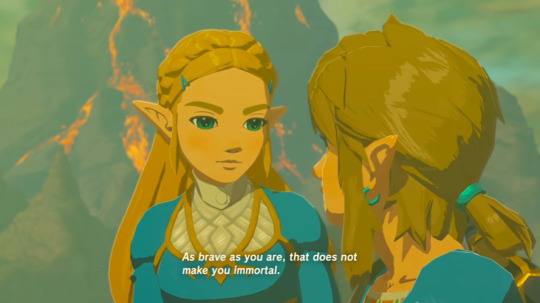

After that, returning to her diary, Zelda writes the following:
"Bit by bit, I've gotten Link to open up to me."
"When I finally got around to asking why he's so quite all the time, I could tell it was difficult for him to say. But he did. With so much at stake, and so many eyes upon him, he feels it necessary to stay strong and to silently bear any burden. A feeling I know all too well... For him, it has caused him to stop outwardly expressing his thoughts and feelings. I always believed him to be simply a gifted person who had never faced a day of hardship. How wrong I was..."
and then, in the last sentences:
"I wish to talk with him more and to see what lies beneath those calm waters, to hear him speak freely and openly...And perhaps I, too, will be able to bare my soul to him and share the demons that have plagued me all the years."
And with that quote in her diary, we found out that yes, Link can talk in the game and that's quite interesting to add. Another very interesting thing to add is how Zelda talks about how one day she will give her soul to him. I looked it up and it means to tell someone tell your secret thoughts and feelings.
For all these years, Zelda has been pretending to be a person that her father (the King of Hyrule in BotW) wants him to be and even, she tried to open up to her father and this happens in one of the memories too, when he found out that she was taking a break from her training to try to awaken the sealed power but, instead of acting like a father, he acts rudely, saying that she should focus on her training instead of wasting time on silly things.
If we go to her father's diary entries, he says:
"The reason her sacred powers still won't awaken is because, she's speding all her efforts playing at being a scholar!"
With that, we realize that Zelda during those years was pressured by her father and was never able to open up to anyone. During two memories, we discover that she was unable to contact two of the goddesses, the goddesses of power and courage. With that, she also mentions that she will go to Mount Lanayru, in hopes of being able to speak with the Goddess of Wisdom but, once again, she is unsuccessful and we see this in the memory, where she returns with Link from Mount Lanayru.

This is where things start to get interesting. Still in the same memory, Mipha speaks "If I may...I thought you...Well, I'm not sure how to put this into words...I'm actually quite embarrased to say it. But I was thinking about what I do when I'm healing. You know, what usually goes through my mind...It helps when I think-when I think about-"
Unfortunately, she isn't able to finish the sentence due to the Calamity Ganon waking up at the exact moment but, I strongly believe she meant "It helps when I think about..." (the person I deeply care about/love).
Skiping now to the last memory of the game, we see Link surrounded by several guardians while protecting Zelda. She begged him to run away and leave her to save himself but, Link wouldn't. About to die for the guardian, Zelda gets in front of Link to protect him and finally, after years without success, she finally manages to awaken her power.
Zelda ends up saving Link, sending him to the Shrine of Resurrection. 100 years later, when Link was fully healed, she aided him throughout Hyrule and helped him to defeat Ganon.

After having sent Link to the Shrine of Resurrection, in other memorie, Zelda goes to Korok Forest with the Master Sword to the Great Deku Tree. During this they have a conversation and in this, Zelda says:
"Great Deku Tree, I ask you, when he return, can you please give this message...Tell him I-"
"Now, then...Words intended for him would sound much better in the tones of your voice, don't you think?"
"Yes."
We never learn what her next words were but, with that scene and for me, it's the last detail that proves that Zelda didn't have a reason to find the power inside her but, when she did find a reason, protecting the person who she cared/loved about, she was finally able to accept who she was and with that, she finally awakens her power and in the end, saves Hyrule from the Ganon Calamity. Until now, Zelda's feelings for Link were just a theory but, I discovered more solid evidence which clearly shows that Zelda is in love with Link. After you complete the game, in the village of Rito, you will meet Kass and he will tell you about his master, who was part of the Sheikah Tribe and who was in love with the princess, better known as Zelda, however, Kass himself mentions that "But the princess herself only had eyes for her escort, her own knight attendant."
More evidence, in the lyrics of the game's ending song it says "An ancient hero, a Calamity appears, Now resurrected after 10,000 years. Her appointed knight gives his life, Shields her figure, and pays the price. The princess's love for her fallen knight awakens her power. And within the castle, the Calamity is forced to cower" and with that, i say checkmate.
Part 2: Link's Feelings and Thoughts about Zelda
Intro
BotW world is an absolutely huge and expansive one that contains many secrets. Some of them may be obvious and can even be found in the game itself but, there are others that only you will be able to find if you do research outside the game.
Unlike the other diaries of the characters in the game, Link's diary is not found in any location in Hyrule but, in the side quests themselves but, this diary is only exclusive to the Japanese version. In other words, the version translated from Japanese to English, they decided to change and put the translation of the side quests in 3rd person but, in the original version, the Japanese one, the game presents the sides quests in the 1st person, that is, in the Japanese version of the game, the side quests are told from Link's own perspective and not the player's, thus creating a sort of Link's diary. blowing minds
But first, before talking about what Link thinks about Zelda, I think it's important to talk a little more about the character itself. In Hyrules Warriors: Age of Calamity, 100 years before the events of BotW, Link is introduced to us as a Silent Knight and Skilled Swordman who is renowned for his figthing skills courage and his devotion to the Royal family of Hyrule. Slowly but surely, Link is becoming much more expressive with his emotions as time progresses. In BotW, there is a cutscene where we see Zelda and Link riding their horses together. At this moment, Zelda thanks Link for his advice on how create a bond with her horse. This means that some point, Link must have shared his expertise on horses with Zelda, in order to help her to do that he needs to speak or at least, write it down for her, although we don't see this in game. It's very possible that Link directly spoke with Zelda here so, it's not like Link is incapable of speaking or of any communication at all, is just that he chooses not do but why? Well, the answer is in Zelda's own diary. In her diary, Zelda says the following:
"With so much at stake, and so many eyes upon him, he feels it necessary to stay strong and to silently bear any burden. A feeling I know all too well... For him, it has caused him to stop outwardly expressing his thoughts and feelings"
Link tells Zelda that the reason he doesn't speak is because, he feels it's necessary to stay strong and to silently bear any burder so actually, our beloved protagonist has fell strong emotions all along, he had just decided to keep them all bottled to himself in order to appear reliable and strong to Zelda. What else can we find out about Link? What does he really think of Zelda? Well, Link actually has an extensive character description in BotW. We can find the answers to these questions and more as Zelda and the King of Hyrule aren't the only ones with diaries. Link has written a diary of his own.
Link's Diary
So, Link's diary where is it? Well, as I mentioned before, Link's diary is hidden in the side quests of the Japanese version of the game. In japanese version however the answer becomes clear all of the entries in the adventure log are entries that Link has written himself to keep track of his own adventure. The English version of the game, the journal entries are written in 3rd person and refer to the reader as you but, upon loading up the japanese version, instead of being written in 3rd person, the journal entries are written in 1st person from Link's prespective. All of the entries in the journal were written by Link but, the surprises aren't just limited to this in his diary. Link doesn't just record his current objetive, he also has written down some of his own thoughts and feelings. With a lot of views and yours in comparasion the same quest "Captured Memories", in the Japanese version can be translated to something like this:
"I've acquired the legendary Master Sword, the legendary blade of evil's bane. Somehow, I get the feeling that the sword itself is delighted that I've come to retritive it.
Zelda is still battling to supress the evil Ganon at this very moment...She believes that I will defintely come for her!
I wonder if...As I am now...Am I really strong enough to save her?"
While in the English version of the game, the quest is described like this:
"You've visited all 13 of the locations shown in the old pictures and recovered the associated memories of your days with Princess Zelda.
In your memories, Princess Zelda always seemed burdened by her task...
Go and save her as quickly as you can to finally ease that burden."
The quest text in the Japanese version essentially reintroduces Link to us as someone who has normal human emotions rather that the silent knight or silent hero decipted through the games knowing that the adventure log belongs to Link as his diary. Suddenly, the seemingly trivial text reveals more hidden sides to our hero, especially the last part "see her smile again with my own eyes". They completely omitted this from the English version it's words like these that add so much more to Link's character. After Link has conquered the lost woods by not getting lost, he reaches the inner sanctum of the forest where he meets the Deku Tree who has been guarding the Master Sword, legendary sword of evil spain. When Link has regained enough of his former strength, he pours the Master Sword from his pedestal. Once more, after he obtains the Master Sword, the adventure quest text for heroes in English versions, reads:
"You've acquired the legendary Master Sword, that which seals the darkness. You feel that the sword itself delights to be in your possession...
Even at this moment, Princess Zelda is within Hyrule Castle, figthing to suppress the Calamity. She endures, believing you will come for her...
Will you be able to save her as you are now?"
When comparing it to the Japanese version is quite similar apart from one word which points towards more evidence of Link being the author. A Japanese word can mean "myself" or "yourself" and it changes the text a first person's narrative. This means that the text would read something like:
"I've acquired the legendary Master Sword, the legendary blade of evil's bane. Somehow, I get the feeling that the sword itself is delighted that I've come to retritive it.
Zelda is still battling to supress the evil Ganon at this very moment...She believes that I will defintely come for her!
I wonder if...As I am now...Am I really strong enough to save her?"
With that, we can really get a feel for how strongly Link wants the power to be able to save Zelda. In the quest "Destroy Ganon", the last section in English is written:
"The ghost of King Rhoam told you that Hyrule is on the brink of annihilation.
Princess Zelda is currently fighting to contain Calamity Ganon inside Hyrule Castle, but her power cannot keep him at bay forever. Eventually, Ganon will regain his full strength and destroy the world.
Your ultimate task is to aid Princess Zelda in defeating Ganon before that can happen."
But, in the Japanese version is written:
"The spirit of the King of Hyrule has told me that the land is on the verge of being obliterated.
It won't be long until Princess Zelda reaches her limit in containing the destructive power of Ganon at Hyrule Castle. When she does, Ganon will completely regain his power and everything will come to an end.
I really hope I'll be able to save Princess Zelda before that happens..."
Link really wants to believe that he can stop Ganon, stop his power in time and puts an end to everthing. After falling once already, it's no surprise that he may have some doubt in his ability.
Happiness
I was given a bunch of gems from Hudson as a sign of his gratitude for everything that I've done for them so far.
After Link has helped Hudson's establish Tarrey Town and after Hudson's and Rhondson are married in the quest "From the Ground Up", Link shows us his warm-hearted side, he is glad for other people's happiness as a conclusion to from the ground up and in Japanese version, he writes:
"Hudson's and Rhondson's wedding ceremony has concluded and Tarrey Town is really prospering.
I wish those two can live in happiness together forever."
The English version like the others is again written in third person and is directed at telling you the player that you wish the couple eternal happiness rather than Link.
In the quest "Test of Will", Link is challenged by three Gorons to train his tolerance to extreme heat in an endurance contest. After besting the Gorons at their challenge, he records the events in his diary, adding a little of his own humor into the mix in his recorded entry, Link mimics the way Gorons speak by attaching Goro to the end of his sentences:
"Ah! Is that all I'm getting out of you, Kabeta brother Goro? That's too bad, Goro..."
While in the English version, it says:
"Oh, that's all from Kabetta? That's too bad, brother..."
Else, does Link think about Zelda? Well, he thinks her voice is really pretty. In the quest "Follow the Sheikah Slate", which Link recieves at the benning of the game, he seems to quite like Zelda's voice. The last part of the quest text, in English simply reads:
"From Hyrule Castle, off in the distance, you hear the woman's voice speaking to you again..."
In comparasion to the Japanese version, goes a little like this:
"From the top of that giant tower, I could once again hear a girls beautiful voice coming from the castle that looks so far away."
"Follow the Sheikah Slate" is another one of those quests that has had parts submitted in. It's English version counterpart the original is much more descriptive and it allows us to finally connect with Link and his feelings.
Thoughts of a Failed Hero
In BotW, Zelda and Link's relationship is quite the dynamic one. In the very first memory, we see Link who has been appointed as Zelda's knight by King Rhoam. In this cutscene/memory, Link is already welding the Master Sword with the weighty responsibility of being Zelda's personal knight as well being chosen as the hero by the Master Sword itself. There is no doubt that Link is under immense pressure and expectation here. Zelda and the others conduct the ceremony of legend to celebrate Link in fulfilling his destiny despite being a huge step towards spending off the Calamity. Zelda, as mentioned before, doesn't seems too enthusiactic and the whole thing feels tainted with despair. Zelda's resentment towards Link continues to worsen as her insecurities and fear of being unable to awaken her powers.
Urbosa points out that Zelda's, Link is a living reminder of her own failures. Like Link, Zelda is also under immense pressure and responsibility to protect Hyrule. Link dedicated himself to his nightly duties and was able to fulfill his destiny and wield the Master Sword. Whereas Zelda was always told that because she was born into the Royal family, she had to dedicate herself in awakening her powers. Urbosa tells Link that every time Zelda sees him, reminds her how she still hasn't achieved her own destiny.
Zelda and Link's relationship hits a turning point when Link saves Zelda from the Yiga Clan. Zelda and Link begin to develop a genuine bond, Zelda realizes that she is not the only one with doubts, she had originally thougth that Link's silent and stiff behavior was a result of him not liking her but actually, as mentioned earlier, it's because he feels it's necessary to stay strong and silently bear any burden. Zelda's thought that Link's sucess was purely out of natural talent. In her diary, Zelda's says:
"When I finally got around to asking why he's so quite all the time, I could tell it was difficult for him to say. But he did. With so much at stake, and so many eyes upon him, he feels it necessary to stay strong and to silently bear any burden. A feeling I know all too well... For him, it has caused him to stop outwardly expressing his thoughts and feelings. I always believed him to be simply a gifted person who had never faced a day of hardship. How wrong I was..."
Zelda feels guilty for how she had been treating Link so, she tries to talk to him which results in a significant improvement in their relationship. In part 1, we've seen all about what Zelda thinks about Link, but what about Link himself? What does he think of all this?
Still determined to get stronger, Link once again visits the Deku Tree in the Lost Woods. Link returns the Master Sword to his pedestal and is thrown into "The Trial of the Sword" quest where he must survive an onslaught of enemies, starting with none of his own equipament. After finally conquering all 51 merciless levels and making it through to the very end, Link is rewarded with a full powered Master Sword. After he has awakened the Master Sword's full potential, the quest text for try of the Master Sword, in English version reads like this:
"You conquered the merciless Trial of the Sword!
You now have the physical and mental strenght necessary to use the Master Sword to its full potential.
Princess Zelda is no doubt quite happy with your achievement."
But, in Japanese version is a little different:
"I've conquered the relentless Trial of the Sword.
I've obtained the physical and mental strenght necessary to control the full power of the Master Sword.
I'm sure that Princess Zelda would also paise me for how much I've grown."
After enjoying countless hardships and striving to get stronger for so long, it is not until this quest that Link is finally pround of himself and has enough confidence in his ability to face Zelda.
In one of the memories, we see both Zelda and Link running, through the rain, fleeing Hyrule Castle. Meanwhile, Zelda ends up slipping her hand from Link's and ends up tripping. This scene is further proof that Link has feelings for her and that he clearly cares about her. After Zelda says that death of the Champions, her father, the Divine Beasts was her fault, it cuts to this scene where, you clearly get the sad expression on Link's face. If he didn't like her, I don't think he'd stop running to hear her.
With all this vent, Zelda simply surrenders in Link's arms, who accepts her without hesitation or thinking twice.

Then, after defeating Ganon and at the end of the game, Zelda finally granted Link's greatest wish, giving a beautiful smile to Link.

Thanks for reading this far. 😊 Really, it was one of the longest and most laborious analyses I've ever done so far but, it was worth it because, it made me love this ship more and see Zelink in other perspective.
275 notes
·
View notes
Text
THIS DAY IN GAY HISTORY
based on: The White Crane Institute's 'Gay Wisdom', Gay Birthdays, Gay For Today, Famous GLBT, glbt-Gay Encylopedia, Today in Gay History, Wikipedia, and more … April 23



1616 – On this date the English writer and actor William Shakespeare died. He was born in 1564 and baptised on the 26 April, probably within 2 or 3 days of his birthdate. (One legend is that he died on the day that he was born - which would make his birthdate also today, 23 April)
Shakespeare is the most important playwright and poet in the English or any other language, but Shakespeare's sonnets are cited as evidence of his possible homosexuality.
The poems were initially published, perhaps without his approval, in 1609. One hundred and twenty-six of them appear to be love poems addressed to a beautiful young man whom he addresses as 'Fair Lord' or 'Fair Youth'; this is often assumed to be the same person as the 'Mr W.H.' to whom the sonnets are dedicated. The identity of this figure (if he is indeed based on a real person) is unclear; the most popular candidates are Shakespeare's patrons, Henry Wriothesley, 3rd Earl of Southampton and William Herbert, 3rd Earl of Pembroke, both of whom were considered handsome in their youth.
It remains unclear whether the Fair Lord and Fair Youth addressed represent real individuals, or even whether the authorial "I" who addresses them represents Shakespeare himself, though Wordsworth believed that with the sonnets "Shakespeare unlocked his heart".
Even though he married Anne Hathaway and had three children, the circumstantial evidence, such as in his sonnets and plays, suggests he did have an erotic interest in men. Evidence of these homosexual tendencies comes from an analysis of his sonnets, which address his "great love," who seems be a young man.

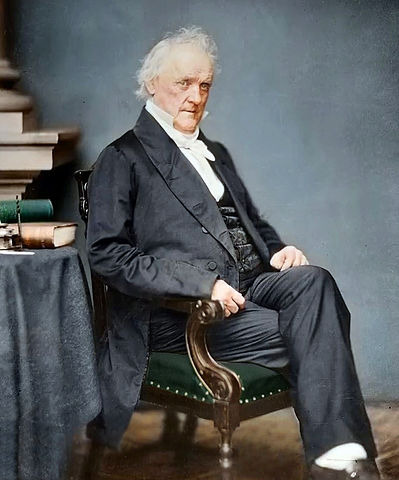
1791 – Today's the birthday of James Buchanan (d.1868), the 15th President of the United States and the nation's only bachelor chief executive, unanimously considered worst president in U.S. history.
For fifteen years in Washington, D.C., prior to his presidency, Buchanan lived with his "close friend," Alabama Senator William Rufus King. King became Vice President under Franklin Pierce. He took ill and died shortly after Pierce's inauguration, and four years before Buchanan became President. Buchanan and King's close relationship prompted the surly Andrew Jackson to refer to King as "Miss Nancy" and "Aunt Fancy," while Aaron V. Brown spoke of the two as "Buchanan and his wife." Further, some of the contemporary press also speculated about Buchanan and King's relationship.
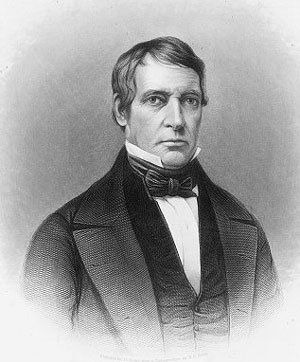
William Rufus King
Buchanan's and King's nieces destroyed their uncles' correspondence, leaving some questions as to what relationship the two men had, but the length and intimacy of surviving letters illustrate "the affection of a special friendship", and Buchanan wrote of his "communion" with his housemate . The circumstances surrounding Buchanan and King's close emotional ties have led most open historians to speculate that he was America's first homosexual president.
Perry Brass wrote us to tell us that in "several cities, most notably Washington, DC, 'James Buchanan Clubs' popped up, joined by wealthy bachelors. The clubs purported to be a place where bachelor men could 'network,' before that word became a verb, but the actual basis of the club was pretty well known: they were clubs for (somewhat) closeted A-gays. Another version of the clubs were called 'Steamboat clubs,' and I'm not sure where that word came from, although I think it had some connection with the Buchanan era as well."
Why was he such a bad president? Well, in a nutshell, most historians consider him responsible for letting the country fall apart into the Civil War. He acquiesced to Southern states (even though he himself was a Pennsylvanian). Buchanan's efforts to maintain peace between the North and the South alienated both sides. As the Southern states declared their secession in the prologue to the American Civil War, Buchanan's opinion was that secession was illegal, but that going to war to stop it was also illegal; hence he remained inactive.
By the time he left office, popular opinion had turned against him and the Democratic Party had split in two. His handling of the crisis preceding the Civil War has led to his consistent ranking by historians as one of the worst Presidents in American history.
If you visit Washington, DC, you can see the lovingly restored cottage of Buchanan's successor (and perhaps the second homosexual President) Abraham Lincoln. Located at the Old Soldiers Home near Rock Creek Park, the cottage underwent a complete renovation to return it to period authenticity as the summer home of the Lincolns during the civil war. What does this have to do with Buchanan? Well, if you stand in the front yard of the Lincoln cottage, across the way you'll see the beautiful cottage that was the summer home to Buchanan and King on those hot steamy Washington summers of long ago.

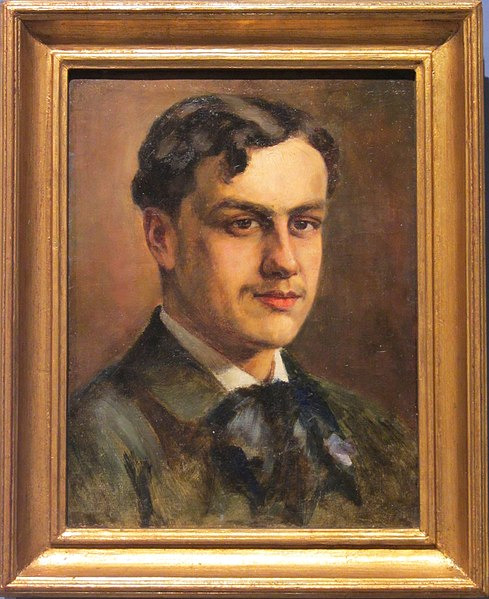
1882 – The Chilean novelist Augusto Goemine Thomson better known as Augusto D'Halmar was born on this date. He is best known as the author of the novel "Pasión y muerte del Cura Deusto" which was published in 1924. It was one of the first novels to deal with homosexuality in an open way. In 1942 D'Halmar was awarded the Premio Nacional de Literatura. He was the first recipient of the honor.


1918 – James Kirkup (d.2009) was a prolific English poet, translator and travel writer. He wrote over 30 books, including autobiographies, novels and plays. He became a Fellow of the Royal Society of Literature in 1962.During World War II he was a conscientious objector, and worked for the Forestry Commission and on the land in the Yorkshire Dales.He taught at The Downs School in Colwall, Malvern, where W.H. Auden had earlier been a master. Kirkup wrote his first book of poetry, The Drowned Sailor at the Downs, which was published in 1947.
In 1952 he moved south to Gloucestershire and became visiting poet at Bath Academy of Art for the next three years. Moving on from Bath, he taught in a London grammar school before leaving England in 1956 to live and work in Europe, the Americas and the Far East. In Japan, he found acceptance and appreciation of his work, and he settled there for 30 years, lecturing in English literature at several universities.
Kirkup came to public attention in 1977, after the newspaper Gay News published his poem The Love That Dares to Speak Its Name, in which a Roman centurion describes his lust for and attraction to the crucified Jesus. The paper was successfully prosecuted in the Whitehouse v. Lemon case, along with the editor, Dennis Lemon, for blasphemous libel under the 1697 Blasphemy Act, by Mary Whitehouse, then Secretary of the National Viewers' and Listeners' Association.
You can read the poem here: The Love That Dares To Speak Its Name

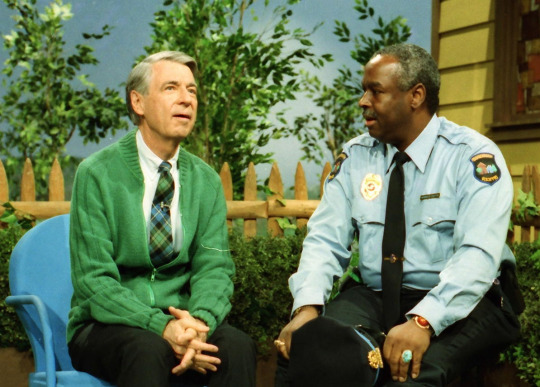
Mister Rogers with Officer Clemmons
1945 – François Clemmons is an American singer, actor, playwright and university lecturer. He is perhaps best known for his appearances as "Officer Clemmons" on the PBS television series Mister Rogers' Neighborhood from 1968 to 1993.
Clemmons was born in Birmingham, Alabama and raised in Youngstown, Ohio. When it was discovered that he had an excellent singing voice, he began performing locally at church functions. He became choir director of his church at the age of 10. His first songs were the spirituals of pre-Civil War America, passed down to him by his mother. He soon branched out across genres, singing with various community groups. For a while, he was the lead singer of a rock 'n' roll group called the Jokers.
Clemmons received a Bachelor of Music degree from Oberlin College, and a Master of Fine Arts from Carnegie Mellon University. He also received an honorary degree of Doctor of Arts from Middlebury College.For 25 years, Clemmons performed the role of Officer Clemmons, a friendly neighborhood policeman, in the "Neighborhood of Make-Believe" on the children's television show Mister Rogers' Neighborhood. In the neighborhood itself, Clemmons ran a singing and dance studio located in the building diagonally across the street from Mister Rogers' house. He was one of the first African Americans to have a recurring role on a kids' TV series, and his presentation – as both a beloved neighbor to Mister Rogers and as a respected authority figure – has been described as a ground-breaking message in race relations.
While attending Oberlin College, Clemmons realized that he was gay, but remained closeted, fearing disapproval from his religious family and the community. In 1968, Fred Rogers told Clemmons that while his sexuality did not matter to him personally, Clemmons could not be "out" and continue appearing on Mister Rogers' Neighborhood, because of the scandal that would arise. In the late 1960s, Rogers and others suggested that Clemmons get married as a way to deal with his sexual orientation, which he did. His marriage to wife Carol did not work out, and Clemmons divorced in 1974 so that he could live openly as a gay man. Rogers remained personally supportive of Clemmons, but required him to avoid any indication of his homosexuality – such as the earring he began to wear as a signifier – on the program.
Clemmons lives and works in Middlebury, Vermont, where he is the Emeritus Artist in Residence of Middlebury College. He is a member of Phi Mu Alpha Sinfonia, the national fraternity for men in music.


1957 – Alex Sanchez's unique background as a youth and family counselor and his experiences as an immigrant have helped make him an important voice in today's young adult glbtq literature canon. Born in Mexico City, Mexico, to parents of both Cuban and German descent, Sanchez immigrated with his family to Texas in 1962 at the age of five.
In a panel discussion at the 2003 National Council of Teachers of English convention, he explained, "Because of my light-skinned father and his German last name (not Sanchez), I learned I could pass as white. I could hide who I was, so that others would like and accept me."
At age 13, Sanchez realized that he was gay. He once again experienced feelings of being an outsider. But this time he felt there was no one he could talk to or relate to. He found no books in the library that described what he was going through, and none to tell him that what he felt was okay.
"So," he explained, "just as I had learned to hide that I was Mexican, I tried to hide that I was gay. I became depressed, quiet, invisible, trying to escape calling attention to myself."
After graduation, he worked as a family and youth counselor for ten years. During that time, he began to write the story that would eventually become Rainbow Boys (2001).
The book features three distinct and well-developed gay teens: an "out-and-proud" gay activist, a jock who starts the book with a girlfriend and family issues, and a low-key closeted teen who experiences prejudice due to his friendship with the more flamboyant character. The characters' stories are continued in Rainbow High (2003) and Rainbow Road (2005).
Considering that the average age most gay Americans now "come out" has dropped from age 21 (in 1979) to around 15 today (and as low as ten), the need for middle-grade glbtq fiction is obvious.
Alex Sanchez is one of today's most influential authors for the glbtq young adult market. His popularity and success is due to many factors, but most notably his believable characters, the timely and relevant storylines of his novels, and the broad appeal of the stories to both gay and straight teens.
Sanchez's books have helped countless gay teens accept themselves while at the same time helping straight readers understand and empathize with gay teens.


1984 – Aras Onur is a Turkish author, poet, and columnist.
Aras Onur was born in Ankara and is a graduate of TED Ankara College and University of Ankara. He started his literary career in the early 2000s. Openly gay, he has been often associated with local LGBT literature.
He is often identified as a socialist in the media, although his conservative tendencies are also often noted. Aras Onur was mastermind of "Kindle a Candle" protests, a wave of civil unrests in Turkey which began on 11 September 2015. The protesters were spurred on by a manifesto released by columnists of the national newspaper Karsi, in which the slogan "Kindle a Candle, Stand Out" was featured.
Onur had written Karsi editorial columns for two years as the acting-editor until he resigned from office in October 2016, following a ban on accessing the paper's website.


1984 – The US Dept. of Health and Human Services Secretary holds a press conference announcing that the virus that causes AIDS has been discovered: it’s HTLV-3, known today as HIV ('human immunodeficiency virus'). AIDS was originally named called GRID – 'gay related immune deficiency'.


2013 – The French Senate approves same-sex marriage.


19 notes
·
View notes
Text
Why are people so dishonest about the origin of "endogenic" systems?
I saw another post bringing back the "endogenic comes from Freud" nonsense, and at one point it tries to counter the point that Freud never said "endogenic" by mentioning that while the German word he used was "frequently" translated as endogenous, endogenous and endogenic mean the same thing.
Now, there's a bit of an anti-intellectual component to this argument since "endogenous" is just a general science-y word for something being internal that is used in countless different contexts. If we're just focusing on endogenous, claiming that a system describing themselves as endogenous is offensive because some people used that word to say other people's systems aren't caused by trauma would be a lot like deciding "imagian" plurals are offensive because fakeclaimers have called headmates imaginary before. But because "endogenous" is more common in academic settings, it's easier to spin that one, while "imaginary" is a lay word used by everyone.
But what really gets me is the choice of the word "frequently." Because the correct word there is "ALWAYS."
Freud's words had ALWAYS been translated as "endogenous" IN EVERY PAPER prior to the plural community adopting the label of endogenic.
The word "endogenic" was first adopted by systems in 2014. The first paper to describe Freud's theories as "endogenic" was released in 2015. If you actually think the truth is on your side, why are you phrasing things specifically to obscure facts when you know better?
Why are you being dishonest?
...
...
...
Okay... I was planning on this being a vague that wasn't going to mention names... but there's something else I need to address... and maybe too much vagueing has been the problem.
Circ... I don't know if you've been personally accused of moving goalposts or demanding an apology from the endogenic community or LunastusCo by others. But if you happen to be referring to posts I made, I can assure you that those weren't about you.
As far as I can tell, the "endogenic comes from Freud" nonsense originated from Dude, the head mod of sysmedsaresexist. In an attempt to smear the endogenic community, they cited that article from 2015 and towards the end of their twitter thread claimed that "this word in particular" (endogenic) had this history and that the "same exact word" is being used in the discussions of the "same exact topic."


Dude's argument has since evolved from "literally the same exact word" to "well, Freud used a German that can be translated to endogenic, but was always translated as endogenous in English, but endogenous and endogenic mean the same thing so it's totally offensive if you squint hard enough (and turn off critical thinking.)"
And I believe it was OopsAllSyscourse who said something about the DID community being owed an apology for the word endogenic being used. It was someone, and I'm about 92.6% sure it was them. SAS might have too but honestly I'm far less certain on that because this was a while ago.
I do feel there were at least 2 different syscoursers I saw that said something along those lines but you weren't one of them.
Maybe your mention of being accused of moving goalposts or demanding apologies weren't referring to me, and other people accused you of those things directly and I just don't know about that. But as someone who has called out people for demanding an apology and has accused SAS of moving the goalposts in this discussion, I just want it on the record that those particular posts weren't about you.
11 notes
·
View notes
Text
Basic history of paganism
Please note: I am pagan and I am writing this as neutral as I can. But I'm giving facts and history. This does not mean I don't respect other beliefs and religions, because I absolutely respect them! and think everyones faith is unique and beautiful in they're own ways.

What the word Paganism means and why it was used-
Paganism is a Christian phrase that refers to faiths that do not worship the God of Abraham, who is essential to Christianity as well as other Abrahamic religions such as Judaism and Islam. Christians have used the labels paganism and pagan, which have negative connotations, to distinguish themselves from others who they think worship false gods.
Throughout much of Christianity's history, few, if any, of those labelled heathen have accepted this term for themselves. However, since at least the first part of the twentieth century, the term has been reappropriated as a self-description by a group of similar new faiths. They are sometimes referred to as modern Pagan or Neo-Pagan organisations and are influenced by religions from Europe, North Africa, and West Asia that became extinct as a result of the advent of Christianity and other Abrahamic faiths.

The history-
Christianity appeared in the Roman Empire in the first century CE. As a monotheistic religion, it held that there was only one genuine God, whom it identified as the God of Abraham, a divinity also revered in Judaism. The majority of the empire's traditions were polytheistic, with several gods and goddesses. For Christians, polytheistic cultures were idolatrous, with deities who were actually devils. This perspective made it difficult for many Christians to seek peaceful coexistence with non-Abrahamic religions.
One hypothesis is that the word pagani, which means "people of the place," came to apply to individuals who continued to worship the traditional deities of their area, whereas Christians came to be referred to as alieni, meaning "people from elsewhere." A second hypothesis stems from an other meaning of the name paganus, "civilian," which became clear by the late second or third century. This second meaning of the phrase was most likely originated by Roman troops stationed in rural areas far from Rome. Early Christians identified as miles Christi, or "soldiers of Christ," and may have borrowed the term "civilian" for anyone who had not joined their religious movement.
In addition to Latin, Christians employed additional names that were basically synonymous. Greek was extensively spoken in eastern regions of the empire, and the labels ethnē and ethnikoi, "foreigners," had a similar purpose. By the early 4th century, the term Hellēnes, "Greeks," had fully supplanted the former. During the 4th century, Christian bishop Ulfilas (c. 311-82) translated the Gospel of Mark from Greek to Gothic and coined the phrase haiþno, which translates to "gentile woman." Variants of haiþno became extensively used in various Germanic languages, including the Old English hǣþen, whence derives the Modern English term heathen.
One often cited theory is that this phrase refers to things that are "of the heath"—it is conceivable that Ulfilas was intentionally invoking the notion of rurality that he felt was contained in the Latin term pagan. The Latin term gentilis (Modern English: "gentile") also occurred in Christian texts to characterise persons who did not worship the God of Abraham, which is separate from the term's now recognised sense of "non-Jewish."
Terms like heathen aimed to create a clear binary separation between Christians, who viewed themselves as holding doctrinal truth, and everyone else, who they believed lived in mistake. Nonetheless, while the label paganism was largely applied to individuals who did not worship the God of Abraham, its use may be wide. For example, the word was employed in the context of sectarian war among Christians. Following the Reformation in the sixteenth century, many Protestants accused the Roman Catholic Church of being pagan due to its devotion of saints and complex rites.
Between the 15th and 19th centuries, Christian Europeans expanded into new territories in the Americas, Asia, Africa, and Australasia. In these nations, they found a wide range of religious traditions that were not dedicated to the God of Abraham and were frequently labelled as pagan or heathen. The many traditions of the Indian subcontinent, now commonly known as Hinduism, were formerly labelled "Hindoo paganism" by 19th-century British authors. Christian missionary initiatives were frequently attempted over the world to convert non-Abrahamic peoples, with different degrees of success.
Changes were visible by the second part of the twentieth century. Growing worries about Eurocentrism and racial discrimination, combined with the promotion of ecumenism and the interfaith movement, have led to a decline in the usage of the labels paganism and pagan by many Christians. However, it has not completely faded from the Christian language. These phrases are still used by certain Christian organisations who have little interest for amicable connections with non-Abrahamic religions.

8 notes
·
View notes
Text

this one's a smaller family tree but covers a surprising amount of ground...
CLAY PUPPET and EARTHEN FIGURE are both actually rather enduring figures in the franchise bestiary individually, but I'm bundling them together here because they're not just recolors they're synonyms. They don't have any apparent source material nor any obtuse meaning, they just both describe a humanoid made of clay or dirt/soil. On the one hand these are fairly generic, with maybe a certain archeological tone to them, but they're also pretty obviously some iteration on the Jewish Golem, whether directly or thru a chain of other influences. Also probably some parallel evocation of things like dogu and haniwa in Japanese archeology.
WENDIGO is a kind of evil spirit cited in the lore of several different Native American groups. It is attributed with the possession of human hosts that it drives to violence and cannibalism (among other typified behaviors) most often in the onset or depths of winter and/or far northern regions where and when food scarcity and starvation would threaten a community. There is a... fraught history, to say the least, of the Wendigo being grossly appropriated in western media that really ramped up since the 1980s, probably peaking with the extremely tacky and insensitive use of it in the 2013 Hannibal TV show.
WIGHT in a really neat kind of obtuse reference with a lot of history. So on the one hand the Wight is also a D&D monster, but as a fairly generic undead warrior, which isn't the reference being made in WA2. In lieu of that you might be tempted to look to J.R.R. Tolkein's use of the full word Barrow-Wight and undoubtedly the root of its pop culture presence. But there too they're just undead warriors. No the root of this reference (and a similar line of thought goes into the Wights of Game of Thrones) is that William Morris's 1869 English transaltion of the Nordic Grettis Saga invented the term "Barrow-Wight" as a translation of Haugbúi --haugr refering to a kind of burial cairn or mound + bui meaning “dweller,” both being old norse. But because William Morris was something of a pioneer and eccentric he opted to try and retain the archaic sound of the old norse, and so instead of translating the term literally into contemporary English, he used "Barrow" a type of burial mound native to britain dating back to pre-christian eras, and "Wight" a term that was already archaic by Morris's time, used in the middle ages, to refer to a person but in a derogatory or vilifying manner, all together to give both the literal meaning and an archaic and ancient tone. So it is once again referring to the undead, and specifically characters who were warrior kings, but also this original use carries with it the connotation of Norsemen, and that is where the affiliation with the ice and cold comes from, hence the white furred yeti-like model in WA2, and the soldiers of the long winter in GoT/SoIaF.
WRAITH is another historical English term referring rather vaguely to ghosts or figures of the dead in the underworld. Dating back to the 1500s in a translation of Virgil's Aeneid.
GASNOID 1ST is a fun one as it kind of cleverly recontextualizes the shared model with WIGHT and WRAITH as gaseous rather than spectral. But it's also an obtuse reference to the Japanese 1960 horror/sci-fi movie, GAS Ningen Dai-ichigo[ガス人間第1号]: "Gas Human #No.1." (the English title is The Human Vapor) Although the name in Wild Arms gives the impression of THE FIRST... in a European style lineage of a ...GASNOID family. The actual Japanese used in the game is in fact, GASNOID1st[ガスノイド1st]. (I wasn't actually thinking about it when I compiled the image, but it's possible that the enemy EM BEING is actually a reference to Denso Ningen[電送人間]: "ElectricalTransmission Human" (aka The Secret of the Telegian) a rival movie that came out in the same year as Human Vapor.)
SHAITAN a super late addition to the franchise, but it shares its model with GASNOID in WA5. It's actually just the Arabic borrowing of the Hebrew Satan[שטן]. And as you'd guess it refers to any of a variety of evil spirits and tempters basically hitting all the marks of its Christian and Hebrew predecessors while also adding in a pretty robust array of unique Islamic lore in the Quran. That's a pretty severe over simplification of things but I'm not about to jump down that rabbit hole because there's just no room here, and stupid William Morris already took up so much...

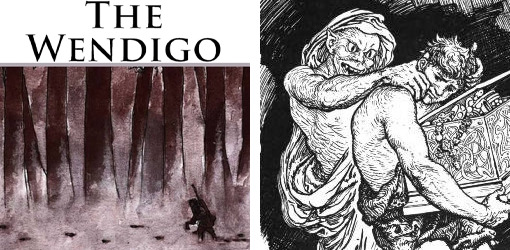

2 notes
·
View notes
Text
Love it when I'm helping some guy (who I'll refer to and treat as a friend in conversation because it's easier and polite even though he's less someone I'd consider "a friend" and moreso a friend by proxy or association) grind his iron banner ranks cause he wants the shader that's going away in a few days
and we come across someone who has their pronouns (she/they) in their username/gamertag
and he decides to — completely unprompted, mind you — go on a rant about how a) he doesn't get, like, or care for the practice of putting pronouns in gamertags and b) "understands the premise" of people "using they as a pronoun" but still thinks it's stupid (or rather, as he put it, "incorrect usage" and "improper english/language"), choosing to reply to my counterpoint that "they" has been used as a singular pronoun for centuries (I cited shakespeare, but I'm aware that's not the first time it was used as such — I just forgot what the first recorded use was) with "yeah, well that's not what it was originally intended for", completely ignoring that language is fluid and evolves with time (and many words have changed their meaning and usage from how they first appeared) and that the first recorded use of "they" in english (according to the oxford english dictionary) is in referring to a singular antecedent
like at this point I'd almost definitely rather just stop interacting with this guy, but for the following things:
a) he's one of the main four people in my current friend group
b) it would be really hard to stop interacting with him without screwing the friend group up, and
bi) I don't want to deal with the fallout that would cause
bii) my general position as the least important person in any group would likely lead to me being the one who got kicked from the group, and I don't really have any other friends who I can interact/hang out with on a regular basis for long periods at present
c) I have basically no one else to play destiny with (no one experienced at the game, at least) and I don't exactly feel like lfg'ing
#venting#personal#also going to note that I'm the dickhead who took english language as a subject#and he's the type of person who doesn't ever bother to analyse media he watches/reads#at least going by his comment about me being “someone who analisise a bunch of shit” [sic]#and yes — I'm currently going through dictionaries and books on the history of english#for the sole purpose of having sources to disprove every part of his completely inane and idiotic reasons for his distaste of singular they
1 note
·
View note
Text
Hashtags and Memes, do they really pass the message?
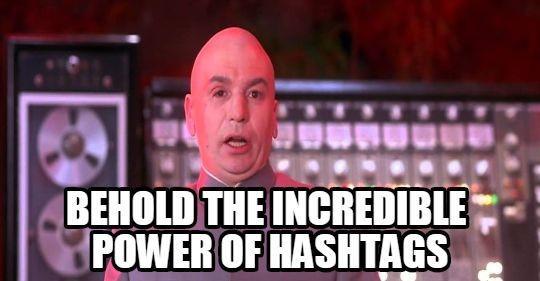
Let me start by saying that this post is not a debate on the impact of hashtags and memes on Digital Activism, this post is about identifying hashtags and memes as a useful form of creative activism in this fast-moving digital world. I believe that by the end of this post you will be able to decide if you want to employ hashtags and memes when engaging in any form of activism.
In academia, there have been various attempts to define a ‘meme’, from my readings the conversations have been around identifying the borders of a meme, what forms a meme?. Memes differ from iconic images and from viral texts that do not experience much alteration. They are never fixed symbols, stories or icons, but interactive aesthetic artefacts that provide a snapshot of the immediate tendencies of culture and public discourses (Goriunova, 2013).
According to Anastasia Denisova “Memes are a phenomenon of the Internet culture and a cherished communication artefact of our times”. In his book, Internet, Memes and Society he proposes the all-encompassing definition of memes for the Internet studies as the context-bound viral texts that proliferate on mutation and replication. He went further to state that memes are “remarkably versatile for meaning-making, emotion-sharing and attention-grabbing in the oversaturated Internet environment. Users exploit them to comment on or discuss all possible issues, from the personal to the societal. A meme is an imitable text that Internet users appropriate, adjust and share in the digital sphere. The initial text may be a hashtag, an expressive image with a tag line, a catchy tweet, an interesting comment, a YouTube video – any digital unit of expression, as long as it conveys certain meaning or emotion and encourages others to either add something to the content or shape, makes a meme prototype.” (Anastasia, 2019). In my opinion, the above is the basic information you need to understand the concept of memes.
----------------------
Being an incomplete, half-baked joke is a remarkable characteristic that sets a meme apart from other jokes. It requires user involvement to fully understand the message. A notable example was our class activity, we were asked to create a meme on the cost-of-living crisis in the UK and below was the meme I created

At first sight, I don’t expect everyone to grab the message but if I further explain, I am very certain that whoever is seeing it will understand what I am trying to say, this is one of the distinguishing features of a meme

Hashtags are very important in the process of articulating digital activism on any social media platform, they are used to track number of engagement in conversations and can also serve as a filter when searching for a community or a topic of interest on social media. The beauty of hashtags is that it might come off as a subtle and indirect approach of activism but it has the power to strongly pass a message.
An example that cites the power of hashtags is the #ENDSARS hashtag from Nigeria that had the world talking, a conversation that started on Twitter spiraled into a world topic and this was because of the hashtag and how it trended worldwide, check the hashtag #ENDASARS for more information.


Now the choice is up to you, will you employ hashtags and memes when articulating any form of activism?
REFERENCES
Denisova, Anastasia (2019) "Chapter 3: Many uses of memes'. In Internet Memes and Society, pp. 27 - 43. New York and London: Routledge.
Goriunova, O. (2013). ‘The force of digital aesthetics: On memes, hacking, and individuation. Zeitschrift fur Medienwissenschaft, 8. Draft in English'. Available at: www.academia.edu/3065938/The_force_of_digital_aesthetics_on_memes_hacking_and_individuatiom (Accessed 7th December, 2022).
Larry Kim (2021) ‘Behold The Power Of Hashtags’ Word Stream by Loca;liq, 1st December, Available at: https://www.wordstream.com/blog/ws/2015/07/02/twitter-hashtags (Accessed 7th December, 2022).
0 notes
Text
Chambers dictionary of etymology online

#Chambers dictionary of etymology online download
#Chambers dictionary of etymology online free
#Chambers dictionary of etymology online download
If the content Chambers Dictionary Of Etymology not Found or Blank, you must refresh this page manually.ĭownload Chambers Dictionary Of Etymology PDF/ePub, Mobi eBooks by Click Download or Read Online button. This site is like a library, Use search box in the widget to get ebook that you want. Click Download or Read Online button to get Chambers Dictionary Of Etymology book now. For guidance on citing Ipso Jure (giving attribution as required by the CC BY licence), please see below our recommendation of "Cite this Entry".Home › eBooks Download › chambers dictionary of etymology Chambers Dictionary Of Etymologyĭownload Chambers Dictionary Of Etymology PDF/ePub or read online books in Mobi eBooks. Please note this CC BY licence applies to some textual content of Ipso Jure, and that some images and other textual or non-textual elements may be covered by special copyright arrangements. This entry about Ipso Jure has been published under the terms of the Creative Commons Attribution 3.0 (CC BY 3.0) licence, which permits unrestricted use and reproduction, provided the author or authors of the Ipso Jure entry and the Lawi platform are in each case credited as the source of the Ipso Jure entry.
#Chambers dictionary of etymology online free
More about free online translation into Spanish of AlcoholÃmetro and other legal terms is available here.AlcoholÃmetr.
Intoxilyzer Translate Intoxilyzer from English to SpanishTranslation of Intoxilyzer, with examples.
More about free online translation into Spanish of Orden cautelar and other legal terms is available here.Orden cautelar.
Interim Order Translate Interim Order from English to SpanishTranslation of Interim Order, with examples.
More about free online translation into Spanish of Objeción, opinión inadmisible and othe.
Inadmissible Opinion Translate Objection, Inadmissible Opinion from English to SpanishTranslation of Objection, Inadmissible Opinion, with examples.
More about free online translation into Spanish of Estupefacientes and other legal terms is available here.Estupefacientes.
Illegal Drugs Translate Illegal Drugs from English to SpanishTranslation of Illegal Drugs, with examples.
Ipsissimis Verbis (Lat.) In the identical words' opposed to substantially.
Applied as a substantive to the unsupported assertion of one person.
Ipse (Lat.) I (before verbs of first person) thou (before verbs of second person) he himself, she herself, he alone, etc.
Intoxicated Drunk from the use of intoxicating liquors.
Intervener A party who seeks to interpose in a suit.
Ipso Facto (Lat.) By the fact itself by the mere fact.
Vocabularies (Semantic Web Information) ResourceĪ group of names, occurrences and associationsĪ topic display format, showing the hierarchy This definition of Ipso Jure Is based on the The Cyclopedic Law Dictionary. Ipso Jure in the World Encyclopedia of Law Maxims are established principles that jurists use as interpretive tools, invoked more frequently in international lawĪ community-driven knowledge creation process, of enduring value to a broad audience You might be interested in these references tools: Resourceįind synonyms and related words of Ipso Jure More about free online translation into Spanish of Por el mismo derecho and other legal terms is available here. Translate Ipso Jure from English to Spanish Meaning of Ipso jure (Lat.) By the operation of law by mere law.

0 notes
Text

Good morning! I hope you slept well and feel rested? Currently sitting at my desk, in my study, attired only in my blue towelling robe, enjoying my first cuppa of the day. Welcome to Too Much Information Tuesday!
If you try to hold a sneeze, you can injure your diaphragm, bruise your eye, rupture an eardrum, or even burst a blood vessel in your brain.
Nearly 60% of Americans have had sex in a car.
An ostrich could run the London Marathon in 45 minutes.
In London, women over 40 are giving birth at twice the rate of teenagers.
A floater is a floater because you drink too many fizzy drinks and have too much gas in your diet.
The Japanese word ‘kareishu’ describes the smell of old people.
Wikipedia has banned The Daily Mail as an “unreliable source”. The online encyclopaedia editors have ruled out the publisher as a reference citing “reputation for poor fact-checking and sensationalism.”
The Trouble said she wanted to meet new people. So, I took her to a maternity ward.
Stephen King initially threw away the first few pages of ‘Carrie’ but his wife fished it out of the trash, saying she liked it and would assist from a female perspective. ‘Carrie’ was his first published book. The paperback version sold one million copies in its first year.
The word ‘crisp’ starts at the back of your mouth and ends at the front.
In 1996, after Tupac was cremated, his ashes were mixed with marijuana and smoked by members of his group The Outlawz.
Nintendo ran a chain of sex hotels in the 1950s.
Hydrophobophobia is the fear of hydrophobia.
What pronouns does chocolate use? Her/she.
During the nineties, North Korean leader Kim Jong-Il and his son, future leader Kim Jong-Un, used fake Brazilian passports to travel to Disneyland.
How do you console an English teacher? There, their, they’re.
Usain Bolt ate 1,000 chicken nuggets during the Beijing Olympics because he didn’t like Chinese food.
Approximately 11% of Americans have never left the state in which they were born.
At the cinema, $30 of raw popcorn translates into $3,000 worth of sales.
In 1931, China banned the book Alice in Wonderland because “animals should not use human language”.
The reason why perfumes are sold at the front of department stores was to stop the smell of horse manure wafting into the store, back before shoppers had cars. It was first thought up by Harry Gordon Selfridge, founder of London’s famous department store of the same name.
New series of ‘Big Brother’ receives 50 million applications after producers confirm that the house will have food and central heating.
Contemplation can help problem-solving and boost creativity. People prefer to keep busy rather than to enjoy a moment of reflection. Losing oneself in one’s thoughts or letting the mind wander is an underrated activity that is more rewarding the more it is practised.
In the music industry, for every $1,000 of music sold, the average musician gets $23.40.
There are two rhymes for ‘orange’ in English: Blorenge (a mountain in Wales) and sporange (a sac where spores are made).
In ancient Athens, if a jury found you guilty of sleeping with another man’s wife, the man whose wife you slept with had the right to sodomise you with a radish.
People who read regularly are two and a half times less likely to be diagnosed with Alzheimer’s.
What do you call a line of men waiting to get haircuts? A barberqueue.
On Christmas Day 1937, during a football match between Charlton Athletic and Chelsea, the Charlton goalkeeper was approached by a policeman and told that, due to thick fog, the game had been called off 15 mins earlier. He hadn’t heard the whistle.
There's only one company that makes Monopoly.
Since 1959, it has been legal to marry a dead person in France, providing you can prove the wedding was already planned.
Okay, that’s enough information for one day. Have a tremendous and tumultuous Tuesday! I love you all.
#mixcloud#mi soul#dj#music#lockdown#new blog#coronavirus#books#democracy#brexit#cronyism#election#tuesdaymotivation
1 note
·
View note
Text
Is “Bardroy” His First Name?
I saw this post recently, saying that Bardroy is his last name, but I disagree.
They cite the moment from ch 176 when Bard tells Sebastian not to call him “Mr” as evidence of this. If this were the only clue we had, I may have been forced to agree. However, it’s not.
But let’s look at the original version of this page first:

In the top left panel, Sebastian refers to Bard as
バルドロイさん
translation: Bardroy-san
Then, on the bottom right panel, Bard replies,
アンタオレの上官なんだろ
“さん” なんか付けるなよ
The first line, somewhat literally translated (more literal than the official English translation) says,
You’re my superior officer, right?
While the second says,
So don’t add something like “Mr”
Though Yana elects to use “さん” in the Japanese with no furigana (telling you how to read it) when Sebastian uses it, she does with Bard, specifically having Bard say “Mister.”
To me, this places emphasis on Sebastian insisting on politeness rather than wanting us to see him as literally calling him “Mr. Bardroy” in English, the same way one would say “Mr Smith.” Especially since Bard specifically says “don’t add something [to my name].”
Two things are important to remember here:
Japanese can use honorifics with first and last names. John Smith can be “John-san” or “Smith-san.” Although it’s typical in Japanese to use last names, perhaps bc all the servants, including Sebastian, go by first name, Yana wanted to maintain that convention so there wasn’t a need to give Bard a surname.
In Japanese manga, there are two kinds of quotation marks used— 「」 and “”. The first is generally used when quoting someone or a particular phrase or word, verbatim, while the second is used more the way we might italics or bold in English—for emphasis. Bardroy is thus highlighting the term more than saying “literally this is what you said”— he just doesn’t get why his superior would be so polite and finds it “creepy.”
In Japanese, it’s generally rude not to use an honorific, but ofc that’s not the case in English. The issue Sebastian has is less with Bard wanting Sebastian to drop the honorific than it is with calling him “Bard” instead of “Bardroy,” since, on the next page, he says it’s not proper to call him by an abbreviated name.

That Sebastian also mentions that “senior servants” like himself and Bard “never call themselves by their first names,” to me further suggests that “Bardroy” is not his last name, but his given name.
The fact that his son is “Bardroy, Jr” also supports the theory that it’s a first name bc “Jr” is used when the person shares their full name (first, middle, last) with their father, and people aren’t generally referred to as “Smith, Jr” but by “John, Jr.”
Lastly, don’t forget that this is the chapter that avoided translating Bard’s (somewhat homophobic) insult to Sebastian as “pretty boy” or “Nancy boy.” (They went with “pale, skinny dude.”) So not sure if I would rely solely on the English when deciding if “Bardroy” is or is not a first name.
Based on the Japanese, that’s my stance on the matter, and unless Yana provides proof to the contrary, I will personally use it as his first name.
#black butler#黒執事#bardroy#baldroy#sebastian michaelis#bard’s name#ch 176#poi og#poi translation#longpost
74 notes
·
View notes
Text
Retranslation of the Sith Code from a Linguistic Perspective
Peace is a lie, there is only passion. Nwûl tash. Dzwol shâsotkun.
Through passion, I gain strength. Shâsotjontû châtsatul nu tyûk.
Through strength, I gain power. Tyûkjontû châtsatul nu midwan.
Through power, I gain victory. Midwanjontû châtsatul nu asha.
Through victory, my chains are broken. Ashajontû kotswinot itsu nuyak.
The Force shall free me. Wonoksh Qyâsik nun.

Star Wars has a couple conlangs – from Huttese to Ryl, many cultures in a galaxy far, far away have their own words. The, admittedly, most famous conlang is Mando’a, the language of the Mandalorians. It has recently gained even more popularity due to The Mandalorian and the many headcanons about the clones and their culture floating around in fandom. While Mando’a is undoubtedly the conlang with the most extensive vocabulary, it is not the soundest Star Wars conlang from a linguistic perspective. That honor belongs to the version of the Sith conlang that was later amended and developed by Ben Grossblatt.
The Sith Code, as we know it, was developed by David Gaider in 2003 for the game Star Wars: Knights of the Old Republic. Grossblatt’s conlang was created seven years later in 2010.
When you consider this, Grossblatt had two options when creating his conlang and translation of the Code. He could translate the Code from English into Sith, or he could pretend the English (or “Basic”) version of the Code resulted from a translation from Sith.
Why does this matter?
[AO3]
This question is easily answered when you think about the various meanings of the words. As every bilingual person knows, translating a text from one language to another isn’t easy because there are no two languages whose vocabulary matches completely. Let’s take an example from the Code:
“asha” (noun) is translated as “victory”.
This translation, however, does not explain what kind of victory “asha” refers to. While English may have only one term for victory, a Sith could differentiate between “victory you achieved on your own” and “victory by decimating your enemies”. Or “victory” might only be one translation of the word and others could be “dominance, control, superiority”. All these words lean into the direction of “victory” through the worldview of the Sith.
Basically, Grossblatt had to decide whether the English version should be the end result or the starting point of his version of the Code in Sith.
In this essay, I intend to treat the English version of the Code as the translation of the original Sith language. This is important because it means that this deconstruction of the Sith Code will be influenced by my own interpretation of the various other meanings as possible Sith word could have, which are not necessarily Canon/Legends based. I will be translating this Code line by line and, in the end, create a new version of the Code which will deviate from the Canon one but hopefully picks up the grammatical cues from the Sith version that the current one is lacking.
TLDR: I don’t want to just explain the grammar, I want to analyze it.
Now, a brief look at the in-universe history of the Code of the Sith to shed some light on the perspective I’ll take into consideration while translating.
The Code itself was allegedly created by the Fallen Jedi Sorzus Syn. It was meant to be a pendant and an update of the Jedi Code simultaneously. While this is technically speaking fine, we do run into some troubles from a historical perspective.
The Code was first authored on the planet Korriban in 6900 BBY. The Jedi Exiles didn’t speak the language of the Sith species, which were enslaved by the Jedi Exiles. They used translation talismans, which granted them the ability to speak and read Sith as if it were their mother tongue.
…
Yeah, that’s stupid. I know. But it’s space fairy tale science fiction, so we’ll accept it and move on.
If you are bilingual, you might notice that you are more capable of speaking about a given topic in one language than in the other. Therefore, it would make sense if it were easier for the Jedi Exiles to talk about the Dark side in Sith, which was uniquely suited to speak about it. However, when the Code only exists as a differentiating point to the Jedi, they were bound to slip into a rhetoric that would be more along the lines of that they’d used as Jedi. That could explain why the Sith Code in Basic/English seems to parallel the Jedi Code so much. My working hypothesis is that the Sith Code – given that it is supposed to reflect Sith philosophy – can stand on its own with its own meaning. Otherwise, the Sith would only ever see themselves in contrast to the Jedi, which, given their superiority complex, is a rather strange view. Therefore, my translation will focus on staying as close to the original Sith language as possible.
Peace is a lie, there is only passion. Nwûl tash. Dzwol shâsotkun.

Now tackling that first line of the Code. The interesting part here is that Basic translates the two sentences as one. The first sentence – Nwûl tash – consists of two nouns: “peace” and “lie”. The present tense copula (the “to be”) is dropped, leaving the two nouns. When comparing this to the following sentence, we immediately see the first issue. The verb dzwol refers to “to be”. We also know it can be translated as “to exist”, “to abide”. The question that arises at this point is whether the first sentence drops dzwol or another verb referring to “to be” that we don’t know. What becomes clear, however, is that different emphasis is put on the two sentences. Many languages drop the tense copula. When the copula is dropped, the relation between the other constituents (components of the sentence) is understood. So reading the first sentence, you gain the impression that the statement “Peace is a lie” is a fact of life. “Peace = Lie” would be a mathematical way of writing it down.
Another critical thing to mention here is that Sith, as far as we know, doesn’t make use of determiners (a/the), and as such, the statement could possibly also be read as “The peace is the lie” or “A peace is the lie” and so on. But given that we do not have any information on the grammar in that aspect, I will not elaborate any further.
Now, let’s take a look at the second sentence by comparison. Here we have an explicit present tense dzwol. Unlike the rest of the Code, this sentence follows the VSO word order. Given that the rest of the Code uses topicalization, we can conclude that the verb dzwol is the focus of this sentence. Given that we are also given the translations “to exist, to abide”, perhaps it would be a more appropriate choice to use one of these words when translating to properly show the difference between the omitted present tense copula and the explicit one here.
Following this, we have to deal with shâsot and -kun. -kun refers to the adjective “only” and modifies the noun. shâsot is interesting because we are given the translation “passion” in the Code. The vocabulary list, however, translates it as “struggle”. While both have overlapping meanings, I would argue in favor of the “struggle” translation.
“Passion” stems from the Latin “passio” meaning “suffering, enduring”. Nowadays, it is used in Christianity to describe the suffering of Christ, but also, citing Merriam-Websters here, “the state or capacity of being acted on by external agents or forces”, as well as being motivated/moved by intense emotions. However, “struggle”, is defined as “to make strenuous or violent efforts in the face of difficulties or opposition” and “to proceed with difficulty or with great effort”. Given that the first sentence of the Code refers to the idea that peace doesn’t exist, I believe an emphasis on the aspect of fighting, which we find in “struggle”, would be appropriate.
Personally, I’d prefer “to exist” over “abide” for the verb as well. “abide” may imply that only the struggle has to be endured. I’d favor a reading that instead emphasizes the contrast that the absence of peace means the presence of nothing but struggle. My translation of the first line of the Sith Code would therefore be:
Peace is a lie. Only struggle exists. Nwûl tash. Dzwol shâsotkun.

Now we can consider the next line: Through passion, I gain strength. Shâsotjontû châtsatul nu tyûk.

Before we can tackle the translation, we have to consider three grammatical construction.
Sith is typically VSO (Verb Subject Object).
Sith has instrumental case, which is marked on the noun with -jontû. Generally, this is translated as “by” or “with” or “using”.
Sith has alethic verb mood, which is marked on the verb with -atul. Alethic mood refers to “the truth in the world” as opposed to epistemic mood, which is “the truth in an individual's mind” (epistemic). While this differentiation is not without criticism, given that all truths in the world are filtered through our perceptions of the world, it is interesting to note that Sith apparently does make this difference.
Now that we have considered these, I will break down the second sentence. The first thing I have to mention is that this sentence and the following ones are topicalized. Shâsotjontû is the word shâsot in instrumental case. As before, I prefer the “struggle” translation. The instrumental case itself is translated as “through” which is an interesting choice as that is not a standard translation. I’d instead go with the “using” translation as it further highlights that a Sith utilizes whatever tools they deem necessary and needed. Objects and people are measured against what value they have for a given person, how useful they are if you want to spell it out. Furthermore, it highlights that the Sith, at one point, actually discussed the Code and the “best” way to use the Dark side.
The verb châtsatul is in alethic mood and translates to “gain”. This, again, also fits well with the “using” translation of the instrumental case. The subject of this sentence is nu the first person pronoun “I”. tyûk translates to “strength”. Here we run into the previously elaborated victory problem as well. The Code gives us no explanation of what kind of strength is meant here. The idea that it’s only physical strength is, of course, ridiculous. It could also cover mental strength and strength in the Force, as well as the words “might”, “courage”, “durability” and so on. This issue concerning the lack of vocabulary will continue to follow us through the complete translation of this text. As I have now elaborated on it twice, I will only make references to it in the future, with perhaps here and there a suggestion for a more appropriate translation.
My translation of the second line, taking -atul into consideration, would therefore be as follows:
Shâsotjontû châtsatul nu tyûk. Using struggle, I necessarily gain strength.

Now we can turn to the third line: Through strength, I gain power. Tyûkjontû châtsatul nu midwan.

The only new word here is midwan, which is translated as “power”. Again, the definition of power in this context isn’t clear. The translation of this line would be:
Tyûkjontû châtsatul nu midwan. Using strength, I necessarily gain power.

We can now turn to the next line: Through power, I gain victory. Midwanjontû châtsatul nu asha.

I already elaborated at length on the various possible definitions of “victory”. I, personally, prefer a reading that equals “victory” to “dominance”. What I also thought was interesting here is that the morpheme “asha” appears to be very common in Star Wars across cultures and languages. There are multiple people named with variations of that morpheme. And then, of course, there is also the planet Ashas Ree, which is deep in the territory of the former Sith Empire and had a Jedi Temple built on top of a Sith Temple. Ashas Ree could be the Basic version of a Sith term. While we do not have the word “Ree”, phonologically, it would be pronounced /riː/, and Sith has the consonant /r/ and the vowel /i:/.
A side note about Sith phonology: Sometime between the Jedi Exiles taking over and the Prequels era, the Sith lost the vowel /e/ or /ɛ/ as the Sith of that time still had words like “jen” meaning “shadow”, “dark”, and “hidden”. As this word, and others making use of it, are apparently still in use today, their vowel probably changed to /i/, /æ/, or /aɪ/. Or maybe the word “jen” is pronounced as it once was as English/Basic does have these vowels, and people can therefore say “jen”.
Returning to our translation, we can read:
Midwanjontû châtsatul nu asha. Using power, I necessarily gain victory.

And now we’re going to look at a line that made me cry:
Through victory, my chains are broken. Ashajontû kotswinot itsu nuyak.

Once more, before we can actually look at the translation, we have to look at the grammar. This is the breakdown Ben Grossblatt made of that sentence:
Ashajontû kotswinot itsu nuyak.
Victory+INSTR break+ERG+LG INAM OBJ chain my+PL.
Through victory, my chains break.

INSTR refers to instrumental case I already elaborated on.
ERG refers to Ergative. The interfix -win- is added to a transitive verb to indicate ergativity, meaning that the grammatical subject of that verb is its semantic object, while the true semantic agent remains unexpressed.
LG INAM OBJ means “large inanimate object”. This refers to the fact that the verb kots is part of a group of verbs called “handling verbs”. These verbs mark what kind of object is affected by them. -ot is the marker for “large inanimate object”. When searching for languages that use these “handling verbs”, Navajo was one of the first results.
Sith plurals appear to be marked on the articles or, given the lack of such, on the possessive markers: nuyak is therefore “my” and “the object I possess is plural”.
Now that we have tackled the grammar, I will elaborate on how it applies to this sentence. The ashajontû construction should be well-understood by now, so I will not linger on it.
Interesting is here that the possessive marker nuyak also indicates the number of the possessed object. In a way, this enhances the claim on the object as it is more intrinsically connected to it. The possessed object here is itsu, the “chain”, which only gains its plural through the possessive. It would be interesting here to know what the other verb markers are as “chains”, in this context, are categorized as physical objects. At the same time, their meaning is obviously meant to be metaphorical. Knowing whether Sith can make the difference and might choose to do so here would be beneficial when analyzing this line. However, evoking the image of physical chains here, which are broken, makes the act seem more striking.
And now we’ll tackle the verb. The root kots gets inflicted twice by the ergative marker and the object marker. According to Grossblatt, it can be read as “completely shatter” or “completely break”. As the purpose of the object marker -ot has already been elaborated on, I will now focus on the ergative marker.
Ergativity is one possible way of hiding the concrete agent of action without passivizing the sentence. Consider “The window broke” vs. “The window was broken” vs. “I broke the window”.
This makes the overall translation of the sentence rather interesting. The original translation reads “Through victory, my chains are broken” which is passive and not ergative. Therefore, it would be more correct to follow Grossblatt’s reading of “my chains break completely”. Still, the fact that we do not have an overt agent here makes this sentence quite interesting. While the method – ashajontû – is known, the agent could be either the speaker themself, or another person doing it for them. Given that the adverb “completely” is added to the verb, perhaps this sentence suggests that on your own, you can come quite far breaking your chains but not reach that finalized step. For that, you need victory.
Furthermore, this offers an interesting perspective on the Sith and their teachings, especially on the Banite Sith, if you read “victory” as something closer to “dominance”. In this case, the sentence almost seems to imply that by becoming stronger and surpassing another person, perhaps your Master, you manage to break your chains completely. An even deeper reading might allude to how the Sith conceptualize the chains that keep them. They appear to put their own freedom and thirst for power above everything else. Perhaps that is already too much interpretation for one line, but it was worth noting. In any case, my translation of that sentence is:
Ashajontû kotswinot itsu nuyak. Using victory, my chains break completely.

After this heavy sentence, we only have one left!
The Force shall free me. Wonoksh Qyâsik nun.

This sentence is relatively uncomplicated. nun is the accusative pronoun “me” and Qyâsik is the Sith word for Force. wonoksh is the word for “to free” in future tense. The future tense is marked by -oksh and this is the part where we get to the slightly complicated/annoying part of the sentence.
Again, we don’t know if this is the only future tense Sith has or what its exact purpose is. As opposed to English, which technically speaking only has the tenses “past” and “not-past”, Sith marks a definite future. However, this future could also have undertones such as an imperative mood. Sadly, we don’t know anything about it. Now for the future tense. As inquires across the globe have told me, “shall” is pretty outdated. In a modern translation of the Code, you’d probably say:
Wonoksh Qyâsik nun. The Force will free me.

But that detail is relatively minor. Now that I have broken down every line of the Code, let’s put it back together.
Peace is a lie. Only struggle exists.
Using struggle, I necessarily gain strength.
Using strength, I necessarily gain power.
Using power, I necessarily gain victory.
Using victory, my chains break completely.
The Force will free me.
Does this Code sound better than the original work? Probably not. I have to say, I do prefer the “struggle” translation and I like the first line more in my version, but otherwise, this Code doesn’t sound particularly great. However, it was also not meant to sound good. The purpose was to create a translation closer to the Sith language version, to reverse-engineer it if you want. I do think that this endeavor was worthwhile as, for me, it has shed some more light on the thinking of the Sith.
And also this:
Sources
Star Wars: The Sith
Sith Language
Speak like a Sith article
Sith Code
Ben Grossblatt’s breakdown of his translation
Sorzus Syn, author of the Sith Code
History of the Sith Dynasties
Wookiepedia Search of asha
Translation talisman
Ashas Ree
Temple of Ashas Ree
Grammar
Zero copula
Merriam-Webster on passion
Merriam-Webster on struggle
Alethic modality
Navajo Handling Verbs
Navajo Classificatory Verbs
Ergativity
Instrumental case
Color Coded Version of this Essay
292 notes
·
View notes
Text
Dragon
A dragon is a large, serpentine creature that appears in the folklore of many cultures worldwide. Beliefs about dragons vary considerably through regions, but dragons in western cultures since the High Middle Ages have often been depicted as winged, horned, four-legged, and capable of breathing fire. Dragons in eastern cultures are usually depicted as wingless, four-legged, serpentine creatures with above-average intelligence.
The earliest attested reports of draconic creatures resemble giant snakes. Draconic creatures are first described in the mythologies of the ancient Near East and appear in ancient Mesopotamian art and literature. Stories about storm-gods slaying giant serpents occur throughout nearly all Indo-European and Near Eastern mythologies. Famous prototypical draconic creatures include the mušḫuššu of ancient Mesopotamia; Apep in Egyptian mythology; Vṛtra in the Rigveda; the Leviathan in the Hebrew Bible; Grand'Goule in the Poitou region in France; Python, Ladon, Wyvern, Kulshedra in Albanian Mythology ,and the Lernaean Hydra in Greek mythology; Jörmungandr, Níðhöggr, and Fafnir in Norse mythology; and the dragon from Beowulf.
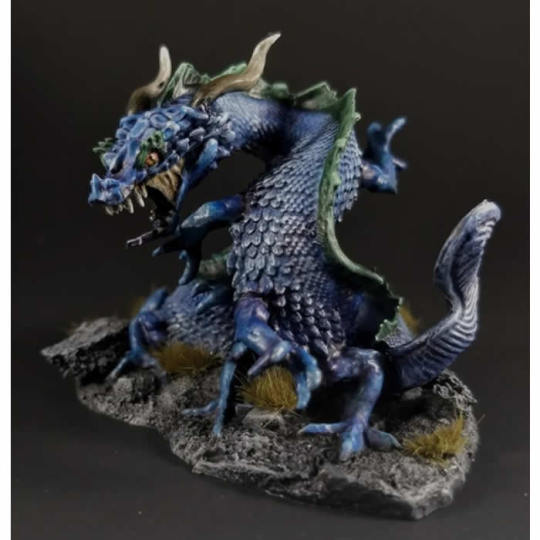
The word "dragon" has also come to be applied to the legendary creature in Chinese mythology, loong, which is associated with good fortune and is thought to have power over rain. Dragons and their associations with rain are the source of the Chinese customs of dragon dancing and dragon boat racing. Many East Asian deities and demigods have dragons as their personal mounts or companions. Dragons were also identified with the Emperor of China, who, during later Chinese imperial history, was the only one permitted to have dragons on his house, clothing, or personal articles.
The impression of dragons in a large number of Asian countries has been influenced by Chinese culture, such as Korea, Vietnam, Japan and so on. Chinese tradition has always used the dragon totem as the national emblem, and the "Yellow Dragon flag" of the Qing Dynasty has influenced the impression that China is a dragon in many European countries. The white dragon of the flag of modern Bhutan is a very classic Chinese style dragon.
Commonalities between dragons' traits are often a hybridization of feline, avian, and reptilian features, and may include: snakelike features, reptilian scaly skin, four legs with three or four toes on each, spinal nodes running down the back, a tail, and a serrated jaw with rows of teeth. Several modern scholars believe huge extinct or migrating crocodiles bear the closest resemblance, especially when encountered in forested or swampy areas, and are most likely the template of modern dragon imagery.
The word dragon entered the English language in the early 13th century from Old French dragon, which in turn comes from Latin: draconem (nominative draco) meaning "huge serpent, dragon", from Ancient Greek δράκων, drákōn (genitive δράκοντος, drákontos) "serpent, giant seafish". The Greek and Latin term referred to any great serpent, not necessarily mythological. The Greek word δράκων is most likely derived from the Greek verb δέρκομαι (dérkomai) meaning "I see", the aorist form of which is ἔδρακον (édrakon). This is thought to have referred to something with a "deadly glance," or unusually bright or "sharp" eyes, or because a snake's eyes appear to be always open; each eye actually sees through a big transparent scale in its eyelids, which are permanently shut. The Greek word probably derives from an Indo-European base *derḱ- meaning "to see"; the Sanskrit root दृश् (dr̥ś-) also means "to see".
Draconic creatures appear in virtually all cultures around the globe. Nonetheless, scholars dispute where the idea of a dragon originates from and a wide variety of hypotheses have been proposed.
In his book An Instinct for Dragons (2000), anthropologist David E. Jones suggests a hypothesis that humans, like monkeys, have inherited instinctive reactions to snakes, large cats, and birds of prey. He cites a study which found that approximately 39 people in a hundred are afraid of snakes and notes that fear of snakes is especially prominent in children, even in areas where snakes are rare. The earliest attested dragons all resemble snakes or have snakelike attributes. Jones therefore concludes that dragons appear in nearly all cultures because humans have an innate fear of snakes and other animals that were major predators of humans' primate ancestors. Dragons are usually said to reside in "dank caves, deep pools, wild mountain reaches, sea bottoms, haunted forests", all places which would have been fraught with danger for early human ancestors.
In her book The First Fossil Hunters: Dinosaurs, Mammoths, and Myth in Greek and Roman Times (2000), Adrienne Mayor argues that some stories of dragons may have been inspired by ancient discoveries of fossils belonging to dinosaurs and other prehistoric animals. She argues that the dragon lore of northern India may have been inspired by "observations of oversized, extraordinary bones in the fossilbeds of the Siwalik Hills below the Himalayas" and that ancient Greek artistic depictions of the Monster of Troy may have been influenced by fossils of Samotherium, an extinct species of giraffe whose fossils are common in the Mediterranean region. In China, a region where fossils of large prehistoric animals are common, these remains are frequently identified as "dragon bones" and are commonly used in traditional Chinese medicine. Mayor, however, is careful to point out that not all stories of dragons and giants are inspired by fossils and notes that Scandinavia has many stories of dragons and sea monsters, but has long "been considered barren of large fossils."In one of her later books, she states that "Many dragon images around the world were based on folk knowledge or exaggerations of living reptiles, such as Komodo dragons, Gila monsters, iguanas, alligators, or, in California, alligator lizards, though this still fails to account for the Scandinavian legends, as no such animals (historical or otherwise) have ever been found in this region."
Robert Blust in The Origin Of Dragons (2000) argues that, like many other creations of traditional cultures, dragons are largely explicable as products of a convergence of rational pre-scientific speculation about the world of real events. In this case, the event is the natural mechanism governing rainfall and drought, with particular attention paid to the phenomenon of the rainbow.
In Egyptian mythology, Apep is a giant serpentine creature who resides in the Duat, the Egyptian Underworld. The Bremner-Rhind papyrus, written in around 310 BC, preserves an account of a much older Egyptian tradition that the setting of the sun is caused by Ra descending to the Duat to battle Apep. In some accounts, Apep is as long as the height of eight men with a head made of flint. Thunderstorms and earthquakes were thought to be caused by Apep's roar and solar eclipses were thought to be the result of Apep attacking Ra during the daytime. In some myths, Apep is slain by the god Set. Nehebkau is another giant serpent who guards the Duat and aided Ra in his battle against Apep. Nehebkau was so massive in some stories that the entire earth was believed to rest atop his coils. Denwen is a giant serpent mentioned in the Pyramid Texts whose body was made of fire and who ignited a conflagration that nearly destroyed all the gods of the Egyptian pantheon. He was ultimately defeated by the Pharaoh, a victory which affirmed the Pharaoh's divine right to rule.
The ouroboros was a well-known Egyptian symbol of a serpent swallowing its own tail. The precursor to the ouroboros was the "Many-Faced", a serpent with five heads, who, according to the Amduat, the oldest surviving Book of the Afterlife, was said to coil around the corpse of the sun god Ra protectively. The earliest surviving depiction of a "true" ouroboros comes from the gilded shrines in the tomb of Tutankhamun. In the early centuries AD, the ouroboros was adopted as a symbol by Gnostic Christians and chapter 136 of the Pistis Sophia, an early Gnostic text, describes "a great dragon whose tail is in its mouth". In medieval alchemy, the ouroboros became a typical western dragon with wings, legs, and a tail. A famous image of the dragon gnawing on its tail from the eleventh-century Codex Marcianus was copied in numerous works on alchemy.
9 notes
·
View notes
Text
Kobayashi’s Maid Dragon S2 Episode 5 Notes
Better late than never! Hopefully I’ll catch up with these before next week’s episode hits.


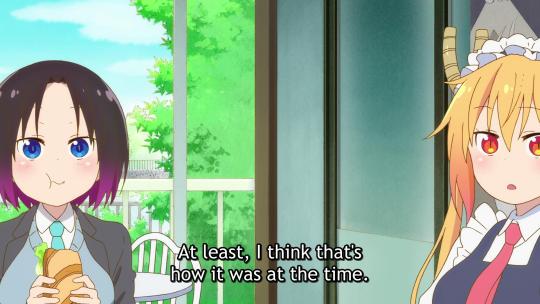
私は、種族全体の目的よりも自分がやりたいことをやっているエルマに、興味がありました。
当時の私、そんな感じでしたし。
What Tohru is saying in these shots is a little different in the Japanese:
“I had an interest in Elma, who was doing what she wanted to do instead of advancing the goals of the species [her faction]. Since that’s how I was at the time, too.”
That is, for the first sentence, Tohru is saying Elma wasn’t interested in the broader dragon goals, not Tohru herself.
Then in the second sentence, instead of a wishy washy “I think that’s how it was?” Tohru says that she was like that too, hence her interest.
So it goes from like:
“I was interested more in Elma than in faction goals, because she was acting freely. I think, anyway.”
to more of a:
“I was interested in Elma because she was acting freely, not bound by faction goals. That’s what I was like too, after all.”
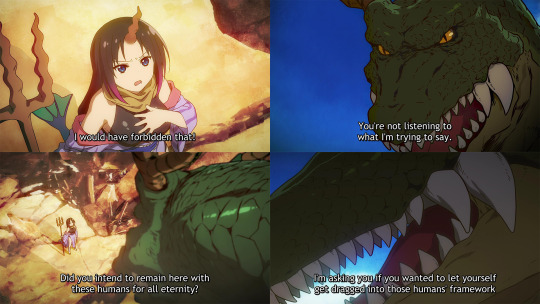
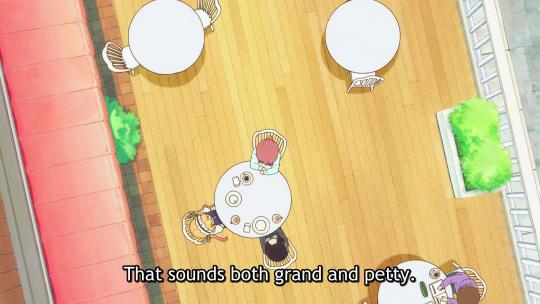
Not sure if it really counts as a translation note, but since I had some questions about it, here’s a few words on the Tohru/Elma disagreement scene.
Tohru thought Elma was like herself: acting not according to what dragon (or human) society asked of them, but according to their own personal set of values. Elma, by allowing herself to be placed in the position of “god” by the humans, had changed that; she locked herself into permanently being a (large, important) cog in the human society. From Tohru’s perspective, she’d lost the one person she felt kindred with, her fellow “free actor.” She doesn’t particularly care what happens to the humans, hence the 私が言いたいことはそういう話ではない (“That’s not what I’m trying to talk about”) when Elma says she’ll just stop the wars from happening: that’s all well and good, but it doesn’t solve Tohru’s issue.
Hence Kobayashi’s response: both grand (involved the fate of nations), and petty (Elma got “trapped” by food, and Tohru’s initiation of the fight was for personal reasons).

喧嘩するほど仲がいい kenka suru hodo, naka ga ii
This is one of those sayings that is often a giant pain in the butt to translate, because it’s not an odd concept in English, but for whatever reason* there is no common pithy saying for it like there is in Japanese, so it’ll almost come off less smoothly.
The idea is that, in order to “have a fight” with someone, you have to already have an established relationship that’s at a certain level of closeness.
Two strangers? Why would you even have a reason to fight, who cares. Two acquaintances? Why deal with it, just smile and nod and go on with your day. Two close friends though? You probably care enough to want to convince them of whatever it is, and/or you don’t want to have to hide your real thoughts/feelings around them like you might around, say, just random coworkers or something—meaning more chances for friction.
*My theory on this is that it comes from the same place as the “wow Japanese people are so polite” stereotype and stuff like honne/tatemae as discussed in a previous episode’s notes: in a situation where two strangers/acquaintances might get into a shouting match in the US, in Japan there’s a comparatively higher chance they just tatemae it up to prevent direct conflict and end the situation early—hence less likely to “have a fight” per se. As always this stuff is just on a continuum though.

What do you call these “clouds” left by planes as they fly? In Japanese, they’re called 飛行機雲 hikoukigumo, lit. “airplane clouds.” And they’re not a season word!
Officially, anyway.
However, they are heavily associated with summer, to the point where you if you google around to find out if they are a haiku season word, there are a whole bunch of sites to tell you no, they’re not, stop asking. That doesn’t mean they’re not a great way to tell the audience it’s summer anyway, though!
If you’re curious as to why the summer association: how long vapor trails like this remain visible depends heavily on how humid the air is. More humidity, longer trails. And Japan has very humid summers (and very dry winters!).
If you’ve heard the song Tori no Uta, the OP to Air (also animated by Kyoani), hikoukigumo is the very second word in the lyrics—no coincidence given the heavy summer theming! If you haven’t heard it, I suggest giving it a try.
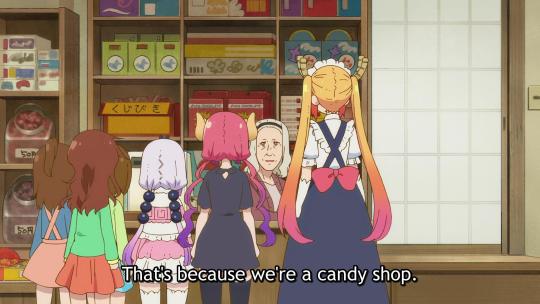
“Candy shop” here is 駄菓子屋 dagashi-ya, which is a kind of store that specializes in very cheap varieties of “candy” (maybe more accurately snack foods?): dagashi. If you’re seen/read any of the series Dagashi Kashi, you’re familiar with this variety of snack.
Dagashi is so called because, back in the Edo period, quality white sugar was super expensive and not something commoners could typically eat. Cheaper brown sugar was, though, so you ended up with different terms for stuff made from each: the expensive 上菓子 jougashi and the cheap 駄菓子 dagashi.
Later, in the Showa period after WW2 when the average person was able to afford a bit more, the term stuck around but more generalized, referring to a wide variety of cheap snacks. These snacks are not necessarily always sugary, and they often have some sort of gimmick so it wasn’t “just” a piece of candy—toys attached, or games/puzzles, or requiring some interesting way to eat/drink them. If you grew up with Dunkaroos: that kinda thing.
Similar to “penny candy,” dagashi was/is cheap enough for children to afford several different varieties of with just a bit of change from their parents, and small stores specializing in them—dagashi-ya—sprung up all over the country, quickly becoming a popular spot for kids… and, not too long after, a symbol of childhood nostalgia.
They’ve been on a big downtrend in the last few decades however. The spread of convenience stores as a competitor for snack buying is often cited as one reason, while a greater variety of ways for kids to spend their playtime now (video games etc.) is another.



You’re probably aware, but of the many reasons to bow in Japan, to show humility when making a request is a big one.
Of note here is that Tohru doesn’t push Ilulu’s head down, which other characters in other shows might have done here, but just lightly reminds her: yeah okay you’re a dragon talking to a human, but you’re the one asking—act like it. She does, and her sincerity is rewarded.
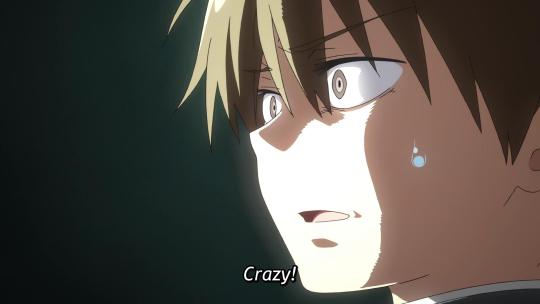
The word here is ぱねぇ panee, which is a heavily abbreviated form of 半端(では/じゃ)ない hanpa nai, ~lit. “not halfway/half-done/half-assed.”
hanpa ja nai→hanpa nai→hanpa nee→panee
It’s used probably how you’d expect: describing something intense af.
(I’m mostly just bringing it up because I love super-shortened slang like this!)


The phrase for “like” here is 気に入った ki ni itta, which is basically to have an interest in something/someone, to take a liking to, to say something is a favorite, etc. When said of another person, there’s typically an air of the speaker considering themselves in a higher position. It generally isn’t “like” in a romantic sense.
Take’s “hey that’s my line,” comes from the fact he’s (in his mind) in the position of power and was judging her on whether he’d try to kick her out of the job. You can tell he was thinking of it as “I like the cut of your jib. I guess you can stay.” kind of thing.
Normally a new employee would not say this about their new boss/job, even if they did like it, though a boss/senpai could of a new employee, hence the “what?”

Notably, Ilulu used “like” earlier in the episode to refer to Tohru as well. In that case it was 好き suki, which is a more literal “like,” with the various implications that may or may not have. Personally, it strikes me as a little odd to translate them both as “like” in the same episode.
And that’s it for episode five! I’m

14 notes
·
View notes
Text
Because I hate myself, I decided to go to the effort of compiling as much lore as I could extract from the hosts (exclusively from The Ride since it’s way more linear) because a lot of it was cool and I didn’t assume there would be so much.
Under the cut is over 101 facts (yet it’s undeniably incomplete, I know there’s more) about the hosts presented in the game, all organized chronologically, cited with each episode they come from (yes when I say hosts I mean all of them, got some Buzz lore for the Buzz stans).
This took me over a week to make. God forgive me.
Cookie:
Enjoys drinking, however considering he gets drunk to the point of vomiting off 1-2 drinks, he might be a bit of a lightweight [or it’s just exceptionally strong beer] (Language)
Has a level of infatuation for Jean-Claude Van Damme, to the point the others are concerned [if anyone actually has voice clips from this sequence I really want to hear it] (Censorship)
He is lactose intolerant, but does not consider soy milk a justifiable alternative (Dairy)
Has a sense of hostility towards Old McDonald, of all people (Dairy)
Cookie cheats at Battleship (War)
Hates turtles some reason [fuck you] (War)
Cookie wishes he had four arms. Mainly to “hold stuff”, as he puts it (American Politics)
Doesn’t/didn’t know what the coccyx is (Parents)
Responds very positively to the prospect of drag, giving a more than excited “oh yeah!” when explaining drag to the players, possibly into it [however he sees it slightly differently on the Censorship floor if you pick an incorrect answer pertaining to drag] (Fetishes)
Used to love Hi-C as a kid (Fetishes)
None of his behavior [which is enhanced the poorer you do, including, but not limited to, getting more than upset with the player for choosing an answer that sounded like talking back] in the Fetishes floor felt faked [in fact, him making a more submissive comment in Crime sounded uncharacteristically faked], this man is a fuckin sadist [sexually!] (Fetishes)
No hesitation to hit on the ungendered [yet most likely at the time, male] player[s] [how bisexual of you Cookie] (Fetishes)
Has breasts due to taking estrogen [in the form of Loestrin] (Pharmacy)
Terrorized his hometown neighborhood with a hose [strangely endearing] (Pharmacy)
Favourite instrument is the calliope, stating it is impossible to stay mad when it plays (Circus)
While being a hardass like all the other hosts, Cookie takes the concept of the players seeing him as only a computer program personally heartbreaking (Food)
Has had sex in the woods, which he was caught doing (Food)
Had a crush on Lois Lane, Daphne from Scooby Doo, and Jessica Rabbit. He seems to have shame for the latter (Crime)
He has/d multiple Heather Locklear posters hanging in his bedroom. He later refers to her as his “future wife” (First Things)
Related to the Heather posters, Cookie also had a Leif Eriksson poster in his junior high locker [at this point I think Cookie really likes posters] (First Things)
Considering changing his name from “Cookie” to “Ø” [hehe. Cøøkie] (First Things)
Not a fan of goths [he’ll come around] (Death, requires multiple specific responses to trigger)
Frequently forgets how to pronounce the word “scythe” (Death)
Wants dodgeball to be an Olympic sport (Gym Class)
Guy:
Miserably hates Gibberish Questions (Gibberish Question, random)
Has never fully read a book, however he received good grades in English class (Shakespeare)
Exceptionally defensive of the movie It’s A Wonderful Life (Office Supplies)
Absolutely obsessed with Bette Nesmith Graham, the inventor of liquid paper (Office Supplies, requires multiple specific responses to trigger)
Talks to his pens, which “talk” back to him (Office Supplies)
Guy recalls people calling him “parsimonious”, meaning he is stingy [how often this should come up, I don’t know] (Urban Life)
Walks with a slight limp due to sexual assault in prison [GUY!??!?] (Deprivation)
Thinks the Pillsbury Dough Boy is cute, like, REALLY cute (Crusty Things)
Shows signs of being a bacillophobe, stating that people should wear hairnets, as well as tissue boxes on their feet, which he adds “like me” [weirdly enough, he isn’t threatened at all in Plagues] (Hair)
However in the very next question Guy mentions knowing what platform shoes feel like, so how often he wears said tissue boxes is debatable. Also he mentions having worn a push-up bra before [wait isn’t Cookie into crossdressing-] (Hair)
Dated a “dancer” [likely of the exotic variety due to him at first pronouncing a “s” in reference to her occupation] named “Maria Bouncer” (Journalism)
Sexually stimulated by Tony Gwynn [specifically his batting average but I don’t think it’s exclusive to it] (Sex)
Genuinely thinks Blue Öyster Cult is a country band [it isn’t] (Rural America)
Owns and wears a muumuu [wait isn’t Cookie still into-] (Rural America)
Likes trees a lot, to the point of hating George Washington over it (Wood)
Likes Shamrock Shakes to an… unhealthy degree (Skin)
As much as a jerk he is, like the other hosts, he is good about keeping his promises, and will feed you dessert if you get a correct answer (Skin, requires multiple specific responses to trigger)
Guy is good at the game Quarters, and is not playful about forcing you to drink for messing up (Lawyers)
Seems to be on neutral ground with Schmitty, as he had the ability to sick the trap door on Schmitty, but chose to simply push him out the door/yell at him (Lawyers)
Does not disapprove of cannibalism (Hollywood more directly, but freely jokes about it in Skin as well)
Hates movies that require reading subtitles (Hollywood)
While as much a sexual deviant as the other hosts, Guy is not into one-sided deviancy, and gets upset at the concept of the players being too good at sexual questions outside of the Sex level (Hollywood, requires multiple specific responses to trigger)
A select group of people call him “Roberta”. Guy establishes that he doesn’t want to talk about it (Hollywood)
Shamefully addicted to Pringles (Plague)
One of the random incorrect answer responses involves Guy yelling for an intern to bring him a gun. That paired with Guy mentioning having a genuine mental breakdown over a milkshake (Skin) makes it feel like Guy has suicidal urges that should be looked at.
While not really a fact, it’s genuinely cute that one of the floors you visit with Guy hosting is the same floor that Cookie sent him to in the beginning of the game. However, Guy never points this out, so Guy has bad memory (Hollywood)
Schmitty:
Likes Guy enough to bother him while Guy is working, possibly genuinely wanting to tell him jokes (Lawyers)
Refers to money as his best friends (any level, unique to hitting $3653)
His address is 3311 something (any level, unique to hitting $3311)
Schmitty has expensive taste in underwear (any level, random when you hit a value <$1000)
Schmitty states that the only enjoyment he gets out of his miserable life is watching people screw each other over. Schmitty needs therapy (any level, response to handing out screws)
Enjoys breaking other people’s [namely Old Man] Lego sets [the bastard] (Plastic)
Unwillingly admits he stared too much at the prosthetic in Boogie Nights, as well as being disappointed it didn’t look realistic [very gay, Josh] (Plastic)
Willingly admits to have masturbated to the thoughts of C. Everett Koop [Josh this is worse than the last one] (Health & Fitness)
Schmitty really likes clowns and thinks they’re cute (Cold War)
He refers to the glowing bugs Lampyridae as the colloquial term “lightning bugs” rather than the more popularized “fireflies”. In America, that typically means he is from, or grew up around people from the Midwest/South [which is obviously supported by Jackbox Games existing in Chicago] (Mother Nature)
Hates pinball, loves video games [seriously how old is Josh] (Suburbia/Malls)
He is a existentialist (Suburbia/Malls)
As a child, he wore headgear. He puts it on the record that he was mocked for it (Suburbia/Malls)
Alludes to having recently had outpatient surgery [surgery that does not require an overnight hospital stay] due to his diet lacking adequate fiber (Technology)
Hates emoticons with a passion [considering Quips are just advanced emoticons, I really hope he came around on this one] (Technology)
Schmitty owns a pet rat. He also records how much it urinates (Branson, Mo.)
Schmitty writes poetry, but he lacks the confidence to share it with others (Literature)
He doesn’t like Bennigan’s, but not because of the food, but because they sing (Literature)
The “redrum” line makes him irrationally angry (Literature)
He tends to prefer foreign films [inverse to Guy] because they tend to have nudity in them (Old People)
Schmitty has partaken in Gerbilling [for your sake, if you don’t understand, don’t look it up] (Great Hoaxes)
Believes aliens wrote Shakespeare (Great Hoaxes)
Believes all diseases are created by the government. Schmitty is anti- vax (Great Hoaxes)
Schmitty has a “dressing room” that’s made up of a janitor’s closet. Despite it all, he takes it personally that you don’t spy on him while he’s getting changed [this is actually supported in prior games where he doesn’t care that he doesn’t wear pants in the studio despite complaints] (Things You Can’t See)
He is a big fan of “Naked Eyes”, and misses them (Things You Can’t See)
Schmitty really needs a water filter (Switzerland)
Well-done charred burgers are the main reason that Schmitty is not vegetarian (Switzerland)
Has beef with the comic strip Cathy, for being redundant and not funny (Switzerland, requires multiple specific responses to trigger)
His use of “first wife” rather than “ex-wife” suggests he has at least 2 past marriages (Marriage)
Schmitty says that his parents had a large amount of rough patches in their relationship where one was struggling and the other was apathetic. However, in other games it’s confirmed that Old Man is his dad, but Schmitty never knew. Either Schmitty had a step-dad, Schmitty’s parental issues were retconned, or Schmitty’s a goddamn liar (Marriage)
Nate:
Has a level of respect for Guy, considering he asks why Guy allowed them to make him read them, as the both of them almost equally despise Gibberish Questions (Gibberish Question, random)
States he’s single, but mostly because he has very expensive tastes and doesn’t sleep around with just anybody [ok Nate] (Gibberish Question, Easter egg)
Every person he has ever dated was named “Rick” or “Ricky”/”Ricki” [which, as we know, is a gender neutral name, but Nate never defends that fact] (Gibberish Question, Easter Egg)
Nate is at least one year out of college, as well as confirming that he has a degree, but never specifies what his major was (Gibberish Question, Easter egg)
Nate is currently dating a woman [we must assume her name is Ricki] that will call the player disgusting for swearing. (Gibberish Question, triggered by inputting a non-easter egg swear; random)
While not directly stated, Nate inadvertently implies a sense of inferiority for being “small” to which he lashes out in defense over it (Torture)
Nate plays and writes keyboard music (Music)
Considers himself an “art person”, as well as that no one really appreciating or understanding it [broody much huh] (Music)
Nate casually admits to committing musical piracy [good for him] (Music)
Takes Simon Says far too seriously [my thigh actually hurts, Nate please say I can stop now] (Games)
Considering that Nate was the one who sent Schmitty to The Bottom, the fact Nate is surprised that Buzz mentions all four of them being down there suggests either Nate has bad memory, or he expected more from them (Games)
While just about as rude as the others, Nate is a lot better at diffusing situations, saying he’d visit the four at The Bottom after a while, giving compromise to Buzz for being treated unfairly, and complimenting Helen before the game ended (Hot Stuff). Though considering it’s Nate, it’s most likely dismissing flattery to get people off his ass (Games)
Genuinely embarrassed by his feet and toenail fungus [which he is taking pills for] (Beauty)
Not sure how to word this, but Nate is surprisingly chill [for the time the game was made] about drag queens and the concept of women having penises, adding “so what?” when an intern was surprised Madame Butterfly had one [unlike Schmitty cough cough] (Beauty)
While not offering his actual religion, Nate implies he is not Christian (BC)
Nate loves the band Rush, regardless of what the others say (BC)
No matter if you choose “dehydrate” or “drink your own pee”, Nate will suggest he drinks urine. He even implies it’s something he enjoys, saying “it’s not drinking-your-own-pee-fun” or “you will never know what you’re missing” depending if you pick positively or negatively (Water)
Nate’s favourite expression is “you can’t get blood from a turnip”. He also says he doesn’t understand it, regardless of how much he uses it (Water)
He loves putting chocolate sauce on things. Of course, not necessarily things meant to have chocolate sauce on them (Water)
Idolizes ABBA, as well as having gone on tour with them as a “roadie” [to the chagrin of Björn and Benny] (Music)
Fan of, but not to the point of idolizing, Zamfir [who hates him], who appears as the answer for two different episodes, for essentially the same exact question about him (Music, Torture)
Has been to many tailors, and he describes them as being very handsy around his “inseam” [which is the length from the crotch to the ankle] which he takes as flattery (Fashion)
Has stuck a pool cue into one of his orifices, but doesn’t elaborate which (Bad Habits)
Very defensive over the stupid things he says [whether they are jokes or not] yelling “IT’S SILENT, YOU IDIOT” when an intern informed Nate “wrong” was not spelled “cwrong” [he later explains he’s joking but he did get far too offended to not note] (Bad Habits)
Nate objects to the concept of not being allowed to eat “toy rabbits” [I actually have no idea what that means, so I choose to believe he gnaws on stuffed animals to stim, and we leave it at that] (Bad Habits)
Nate buys Viagra for $10 a pill [I calculated inflation, that’s $16.38 of 2021 money] and he’s embarrassed about it (Bad Habits)
The only host to consider that the player character might be female, calling the players both “the little bad boy” and “you little bad girl” (Bad Habits)
Likes his meat well done (Meat)
Staunchly refuses to eat iguana, but is open to trying terrapin and ostrich (Meat)
Thinks Sam Donaldson is sexy [every host has at least one weird crush I swear] (Meat)
Loves bologna (Meat)
Needs to clean out his refrigerator (Hot Stuff)
Arguably the least productive of all the main 4 hosts, only having hosted ten episodes [compared to the others having 16], allowing Buzz to guest host a question (Games), having Brian Chard lead a Jack Attack (BC), and Schmitty accidentally filling in for him during a Jack Attack due to an error within the game (Games)
Buzz:
Schmitty calls him “kiddo”, suggesting that either Schmitty is an asshole [a known fact] or Buzz is the youngest [or shortest- I know how men act] of the five hosts [which would surprise no one] (Games)
According to Buzz in Vol. 2, the only thing written on his birth certificate is “Buzz”, however in this game the guest host card with his name on it says “Buzz Lippman” [where did that last name come from? Did he get married between the two years and he took his partner’s name because he wanted to have one for once? Good for him] (Games)
Very good at math, being able to divide numbers by 12 and 69 accurately to the decimal in his head (Games)
Doesn’t actually hate Cookie as much as people think he does, as he turns to Cookie to ask for help when hosting his question. Cookie however doesn’t supply it. (Games)
Either he is the only host who had Nate’s number on hand to call him, or Buzz is the only host with enough brain cells to think of calling one of the hosts to complain about where he was [Cookie was down there for ¾ of the game, what’s his excuse?] (Games)
#jackbox#jackbox games#ydkj#surprisingly only a few bits contradict each other#like Schmity says in one ep he hates singing yet sings in others so I excluded it#I omitted general trivia and almost all of their female crushes because it felt impersonal#jackbox lore is better when it makes you pause the ep and go ???#sorry to your dash if you open this on accident#jacketybox mumbles
27 notes
·
View notes
Video
youtube
Are you ready for some Deep Sam Flam lore?
...Well, kind of?
I have started a project to compile as many Samurai Flamenco quotes as possible and put them in a Twitter text bot. This is partially for my own amusement, but also so I can collect Samurai Flamenco translations and put it in the attached linktree for cohesiveness. I am starting with quotes from the anime, which includes song lyrics.
...So, I came to a bit of a conundrum when I got to episode 4, Idol Devastation, and Mari blasted a song out of her hummer. Turns out that it is not an original song, but I made an Executive Decision to put it in the bot regardless. Except there’s no English translation. And Japanese lyric websites don’t have it properly transcribed. And it turns out that it requires hours and hours of research to properly decipher all of its religious references.
If you would like to just know the lyrics to the song, they are as follows:
Tera Zukkyun! Ai no Ryouhouji!
Before our love ripens, we’ll have an eternal sleep! Ryoyhou Temple!
Anye manye mane mamane cite carite shame
Shamitavi shamte mukte
It’s a miracle! Ryouhou Temple!
The shintai will help you, shining halo guidepost
Leave the prayers to me; the mutual love of one hundred shrine visits
Lotus Sutra, Chishaku, bodhisattva Manjushri, bhava!
This sutra is profound, complex, subtle, and treasured; worship!
You’re troubled, aren’t you? (Mt. Fuji kamikaze)
You’re in agony, aren’t you, aren’t you? (Shuriken tempura)
Right now, come come come take shelter (Unruly bonze)
Brain fragmentation
Temple buh-bam! Temple buh-bam!
The Ryouhou Temple of love love love love love!
Singing and studying and dancing love will fulfill you
The love love love love love of Hachiouji!
Your hypermutation! Ecstasy! Embrace sukhavati!
Syrupy Tro-Benten!
Sold lots tower over the cemetery’s shining headstone
We’ll give a warm welcome to even the most inexperienced
Bhava, bhava, sattva, sadhana, devote yourself to this sutra to attain bodhi!
Manjushri said the daughter of the dragon king Sagara did this year!
You’re anxious, aren’t you? (Pervert tsundere)
You’re forlorn, aren’t you aren’t you? (Tiny boobs, fatty cut sushi)
Right now, come come come take shelter (Nipples, decapitation)
Entering nirvana, reincarnation
Temple buh-bam! Temple buh-bam!
The Ryouhou Temple of love love love love love!
With my sparkling sadhana, attaining enlightenment, I’ll come into moksha!
The love love love love love of Hachiouji!
Your hypermutation! Ecstasy! Embrace sukhavati!
Syrupy Tro-Benten!
Eight years! (Eight years!) Eight years! (Eight years!) Eight years! (Eight years!) Innate prajna! (Love!)
Factor of life: form, factor of life: nature, factor of life: embodiment, factor of life: potency
Eight years! (Eight years!) Eight years! (Eight years!) Eight years! (Eight years!) Innate prajna! (Love!)
Factor of life: function, factor of life: primary cause, factor of life: secondary cause, factor of life: effect
Eight years! (Eight years!) Eight years! (Eight years!) Eight years! (Eight years!) Innate prajna! (Love!)
Factor of life: recompense, factor of life: recompense, factor of life: recompense, factor of life: recompense
Factor of recompense, factor of recompense, factor of complete fundamental whole
The Ryouhou Temple of love love love love love!
Singing and studying and dancing love will fulfill you
The love love love love love of Hachiouji!
Your hypermutation! Ecstasy! Embrace sukhavati!
Syrupy Tro-Benten!
Temple buh-bam! Temple buh-bam!
You’ll fall in love! Ryouhou Temple!
However, if you want a big deep dive on the lyrics, here it is:
This is the theme song for Ryouhou Temple, a Buddhist temple in western Tokyo. The temple is notable for being...moe, to the degree that it’s nicknamed moeji (moe temple). The reason for this is that it features a moe-fied version of Benzaiten. Benzaiten is a Buddhist goddess, often shown with a biwa.
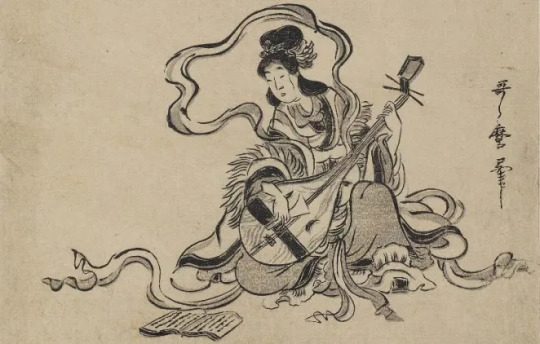
She is the Japanese version of Saraswati, the Hindu goddess of music and wisdom.

The moe version of which is Tro-Benten.

This video is a pretty good summary of the surreal nature of Ryouhouji. With that out of the way, here’s a breakdown.
恋の実ったその先は二人で永眠!了法寺ー!
Koi no minotta sono saki wa futari de eimin! Ryouhouji!
Before our love ripens, we’ll have an eternal sleep! Ryouhou Temple!
“Eternal sleep” or “eimin” here is actually a phrase in Christianity, especially the Orthodox Church. It is a euphemism for death in the Bible.
安爾 曼爾 摩禰 摩摩禰 旨隷 遮梨第 貝余
Ani mani mane mamane shire sharite shamya
Anye manye mane mamane cite carite shame
This is sanskrit, and each of these words is a spell. Technically, each kanji character has meaning, but they serve more of a phonetic sense than a semantic one. Here is the meaning of each of these spells (per this link)
Anye: mysterious
Manye: pondering
Mane: mindfulness
Mamane: serenity in mind
Cite: eternity
Carite: religious practice
Shame: tranquility
貝余履 多王韋 羶帝 目帝
Shabi tai sentei mokutei
Shamitavi shamte mukte
Shamitavi: non-attachment
Shamte: inexpressibly serene silence
Mukte: emancipation
ご利益あります!了法寺!
Goryaku arimasu! Ryouhouji!
It’s a miracle! Ryouhou Temple!
お助けします御神体輝く後光の道しるべ
Otasuke shimasu goshintai kagayaku gokou no michishirube
The shintai will help you, shining halo guidepost
A shintai is a physical object worshipped at temples that has a spirit in it.
They can have a lot of different forms; here is an example:

However, this is the shintai at Ryouhouji:

恋の願いはお任せよお百度参りで両思い
Koi no negai wa omakase yo ohyaku domairi de ryouomoi
Leave the prayers to me; the mutual love of one hundred shrine visits
Hyakudomairi, or one hundred shrine visits, is a practice in Shinto. It’s what it sounds like - visiting a shrine to pray one hundred times.
妙 法華経 智積 菩薩 問文殊 師利言 有!
Myou hougekyou chishaku bosatsu monmonju shirigon u!
Lotus Sutra, Chishaku, bodhisattva Manjushri, bhava!
In general, sutras are canonical scriptures within Buddhism. Buddhism has two main branches - Mahayana and Theravada. Mahayana Buddhism is popular in East Asia, and the Lotus Sutra is one of the most influential texts within that branch. More specifically, it is used for the Nichiren and Tendai sects of Buddhism. Here is a link with a basic breakdown of the concept.
Chishaku(-in) is a Buddhist temple in Kyoto. It is the headquarters of Chisan-ha sect of Shingon Buddhism. That is a sub-section of Vajrayana Buddhism, spread from India to East Asia. In turn, Vajrayana is part of Mahayana Buddhism.
The person for whom the temple was named, Chishaku, is also known as Wisdom Accumulated. He is the oldest son of Great Universal Wisdom Excellence Buddha.
A bodhisattva is someone who is on the path to Buddhahood.
Manjushri is a bodhisattva associated with prajna (wisdom) in Mahayana Buddhism.
Bhava is a term meaning earthly tendencies, birth, and production. Bhava is one of the twelve links of Pratityasamutpada, originally taught by Great Universal Wisdom Excellence. Pratityasamutpada is a key doctrine within Buddhism which emphasizes the connectiveness of all phenomena (dharma).
此経 甚 深 微妙 諸経 中 宝 世所 希有 拝!
Shigyou jinjin mimyou shochou chuu hou sesho keu hai!
This sutra is profound, complex, subtle, and treasured; worship!
This is a reference to Chapter 12 of the Lotus Sutra, in which Chishaku asks Manjushri if one can quickly obtain Buddhahood through practicing the Lotus Sutra.
悩んでいるのでしょう(フジヤマ カミカゼ)
Nayande iru no deshou (fujiyama kamikaze)
You’re troubled, aren’t you? (Mt. Fuji kamikaze)
English-speakers probably know kamikaze in terms of World War II. However, it is also a reference to a typhoon thought to protect Japan from a Mongolian invasion in the 13th century.
...As a side note, the bits in parentheses are sung in an American accent. Make of that what you will.
悶えているのでしょでしょ(シュリケン テンプラ)
Modaete iru no desho desho (shuriken tenpura)
You’re in agony, aren’t you, aren’t you? (Shuriken tempura)
Shuriken is a fairly well-known term, but it is a star-shaped concealed weapon.

Tempura is a popular Japanese dish of meat or vegetables fried in batter (would recommend).

今すぐ来て来て来て駆け込んで(ボウズ ノホウズ)
Ima sugu kite kite kite kakekonde (bouzu nohouzu)
Right now, come come come take shelter (Unruly bonze)
A bonze is a Japanese or Chinese Buddhist monk. In common speech, you’ll often hear “bouzu” as a casual way to refer to boys. This is a reference to the word “bonze.”
脳みそフラグメンテーション
noumiso furagumenteeshon
Brain fragmentation
テラズッキュン寺ズッキュン
Tera zukkyun tera zukkyun
Temple buh-bam! Temple buh-bam!
Tera means temple. The first tera in this is in katakana, and the second is in kanji. I translated them the same, but the first tera may mean the prefix tera-. Terabyte is an example; you could see this line as a SUPER zukkyun.
Zukkyun is a sound effect for gun shots, like “pew pew,” “bang bang,” etc. However, it also is used as a sound effect for rapidly falling in love with something. You can think about it similarly to how one is shot with Cupid’s arrow. Zukkyun can be a sound effect for actual romantic love, or just casual internet talk for indicating you really like something.
愛の愛の愛の愛の愛の了法寺!
Ai no ai no ai no ai no ai no ryouhouji!
The Ryouhou Temple of love love love love love!
歌って学んで踊って恋が成就します
Uttate manande odotte koi ga jouju shimasu
Singing and studying and dancing love will fulfill you
愛の愛の愛の愛の八王子!
Ai no ai no ai no ai no hachiouji!
The love love love love love of Hachiouji!
Hachiouji is where Ryouhouji is located, in West Tokyo.
you超変!有頂天!朴楽抱きしめてね
You chouhen! Uchouten! Gokuraku dakishimete ne
Your hypermutation! Ecstasy! Embrace sukhavati!
This is a reference to Pure Land Buddhism, or Amidism, which is a branch of Mahayana Buddhism. Amitabha is the principal Buddha of this, and the basic idea is that the world is corrupt, so people should wish to be reborn in the Pure Land instead. Sukhavati is the western part of the Pure Land.
とろとろとろ弁天!
Torotoro torobenten!
Syrupy Tro-Benten!
分譲しますぼっち墓地輝く墓石そびえ立つ
Bunjou shimasu bocchi bochi kagayaku boseki sobietatsu
Sold lots tower over the cemetery’s shining headstone
未経験者も大歓迎お一人様でもお気軽に
Mikeikensha mo daikangei ohitorisama demo okigaru ni
We’ll give a warm welcome to even the most inexperienced
頗有頗有衆生 勤加精進 修行 此経 速得仏不
Hau hau shuujou gonka shoujin shugyou shigyou sokutoku bubbu
Bhava, bhava, sattva, sadhana, devote yourself to this sutra to attain bodhi!
In Samkhya, one of the six schools of Hindu philosophy, sattva is one of three gunas. Gunas are the modes of existence (traits) that one may have, and sattva means the quality of balance. It is connected with purity, and serenity.
Sadhana is essentially a disciplined ritual used to obtain one’s goals. The classic trope of standing under a waterfall is an example of Japanese Buddhist sadhana.
Bodhi essentially means “awakening,” often in reference to enlightenment.
文殊 師利 言言有有 裟 竭 羅龍王 女 年始
Monju shiri gongon uu shakatsura ryuu ounyo nenshi
Manjushri said the daughter of the dragon king Sagara did this year!
This is another reference to Chapter 12 of the Lotus Sutra. When Wisdom Accumulated/Chishaku asks if someone can attain Buddhahood through studying the Lotus Sutra, Manjushri mentions that the dragon princess already has.
不安があるのでしょう(ヘンタイ ツンデレ)
Fuan ga aru no deshou (hentai tsundere)
You’re anxious, aren’t you? (Pervert tsundere)
Anime fans probably know this, but tsundere is a portmanteau of tsun tsun, and dere dere. Tsun tsun is basically standoffishness, and dere dere is having a sweet demeanor. A tsundere is a character/person that blends these traits in some way. They are usually either sweet, but become irritable, or irritable by default, then become sweet under some circumstances.

(Hidenori “It’s Not Like I’ll Marry You Or Anything B-baka!” Goto is a tsundere.)
心細いのでしょでしょ(ヒンニュウ スシトロ)
Kokorobosoi no desho desho (hinnyuu sushitoro)
You’re forlorn, aren’t you aren’t you? (Tiny boobs, fatty cut sushi)
今すぐ来て来て来て駆け込んで(チクビ ウチクビ)
Ima sugu kite kite kite kakekonde (chikubi uchikubi)
Right now, come come come take shelter (Nipples, decapitation)
成仏リインカーネーション
Joubutsu riinkaaneeshon
Entering nirvana, reincarnation
Nirvana is a concept in Buddhism (and other Indian religions) that means the release from reincarnation. It is the ultimate goal for salvation.
テラズッキュン寺ズッキュン
Tera zukkyun tera zukkyun
Temple buh-bam! Temple buh-bam!
愛の愛の愛の愛の愛の了法寺!
Ai no ai no ai no ai no ai no ryouhouji!
The Ryouhou Temple of love love love love love!
修行でピカって悟って解脱しちゃいます
Shugyou de pikatte satotte gedatsu shichaimasu
With my sparkling sadhana, attaining enlightenment, I’ll come into moksha!
Moksha is the release from reincarnation. The difference between this and nirvana vary by religion and branch.
愛の愛の愛の愛の八王子!
Ai no ai no ai no ai no hachiouji!
The love love love love love of Hachiouji!
you超変!有頂天!極楽抱きしめてね
You chouhen! Uchouten! Gokuraku dakishimete ne
Your hypermutation! Ecstasy! Embrace sukhavati!
とろとろとろ弁天!
Torotoro torobenten!
Syrupy Tro-Benten!
八歳!(八歳!) 八歳!(八歳!) 八歳!(八歳!) 智慧利根!(愛!)
Hassai! (Hassai!) Hassai! (Hassai!) Hassai! (Hassai!) Chie rikon! (Ai!)
Eight years! (Eight years!) Eight years! (Eight years!) Eight years! (Eight years!) Innate prajna! (Love!)
“Eight years” is a reference to the fact that Sagara’s daughter was only eight when she attained Buddhahood.
如如是相 如如是性 如如是体 如如是力
Nyonyozesou nyonyozeshou nyonyozetai nyonyozerisa
Factor of life: form, factor of life: nature, factor of life: embodiment, factor of life: potency
This is a reference to the Buddhism Ten Factors of Life. Interestingly, these factors were not originally in the Sanskrit text. They were added by the translator, Kumaraju, in the 5th century.
八歳!(八歳!) 八歳!(八歳!) 八歳!(八歳!) 智慧利根!(愛!)
Hassai! (Hassai!) Hassai! (Hassai!) Hassai! (Hassai!) Chie rikon! (Ai!)
Eight years! (Eight years!) Eight years! (Eight years!) Eight years! (Eight years!) Innate prajna! (Love!)
如如是作 如如是因 如如是縁 如如是果
nyonyozesa nyonyozein nyonyozeen nyonyozeka
Factor of life: function, factor of life: primary cause, factor of life: secondary cause, factor of life: effect
八歳!(八歳!) 八歳!(八歳!) 八歳!(八歳!) 智慧利根!(愛!)
Hassai! (Hassai!) Hassai! (Hassai!) Hassai! (Hassai!) Chie rikon! (Ai!)
Eight years! (Eight years!) Eight years! (Eight years!) Eight years! (Eight years!) Innate prajna! (Love!)
如如是報 如如是報 如如是報 如如是報
nyonyozehou nyonyozehou nyonyozehou nyonyozehou
Factor of life: recompense, factor of life: recompense, factor of life: recompense, factor of life: recompense
八歳!(八歳!) 八歳!(八歳!) 八歳!(八歳!) 智慧利根!(愛!)
Hassai! (Hassai!) Hassai! (Hassai!) Hassai! (Hassai!) Chie rikon! (Ai!)
Eight years! (Eight years!) Eight years! (Eight years!) Eight years! (Eight years!) Innate prajna! (Love!)
如如報如 如あ如報 如如是本末究竟等
nyonyohounyo nyoanyohou nyonyoze honmatsukukyoutou
Factor of recompense, factor of recompense, factor of complete fundamental whole
愛の愛の愛の愛の愛の了法寺!
Ai no ai no ai no ai no ai no ryouhouji!
The Ryouhou Temple of love love love love love!
歌って学んで踊って恋が成就します
Utatte manande odotte koi ga jouju shimasu
Singing and studying and dancing love will fulfill you
愛の愛の愛の愛の八王子!
Ai no ai no ai no ai no hachiouji!
The love love love love love of Hachiouji!
you超変!有頂天!極楽抱きしめてね
You chouhen! Uchouten! Gokuraku dakishimete ne
Your hypermutation! Ecstasy! Embrace sukhavati!
とろとろとろ弁天!
Torotoro torobenten!
Syrupy Tro-Benten!
テラズッキュン寺ズッキュン
Tera zukkyun tera zukkyun
Templue buh-bam! Temple buh-bam!
恋ズッキュン了法寺!
Koi zukkyun ryouhouji!
You’ll fall in love! Ryouhou Temple!
....So, why the hell is this in Samflam?
Good question! I can only give some educated guesses.
1. Its chaotic, yet cute nature fits Mari well. I mean...what line better describes her than “chikubi uchikubi”?
2. The repetition of ai no ai no ai works well when compared to the 2nd OP of SamFlam, Ai Ai Ai. In fact, the ai no ai no ai no part is really the only part that appears in SamFlam itself. It could be coincidence, as “love” is a really common word in moe songs, but it is interesting.
3. Might be a stretch, but the song itself is about the juxtaposition between old traditions and modern pop culture. This fits well with a lot of SamFlam’s themes of growing up. Additionally, Masayoshi’s whole shtick is about combining old traditions (his Japanese samurai and Spanish flamenco dancer ancestors) and applying it to...tokusatsu.
I really appreciate if you’ve read this far - I can’t begin to describe the amount of work that went into this. I hope to translate more SamFlam stuff in the future, so stay tuned!
49 notes
·
View notes
Text
The bad Shakespeare takes keep coming, I see. This one had the cleverness to couch itself as a personal narrative (makes it much more interesting, tbh). But as bad Shakespeare takes are my bread and butter, my boon and bane, mamma mia here we go again, with Merchant of Venice.
“But those who thought the play was irredeemably antisemitic were, the consensus went, vulgar and whiny—and, completely coincidentally, they were also Jewish, which somehow magically invalidated their opinions on this subject.”
I’m glad (is that even the right word?) this author found scholars that don’t think this play is anti-Semitic, but my experience with scholarship has been way more mixed than that. Suffice to say, this is literally all the play is known for these days, and views of the play as anti-Semitic are everywhere (Rosenbaum even had a hot take that since the Nazis liked it, it must be anti-Semitic). Didn’t know Harold Bloom thinks this play is anti-Semitic, though. That in itself is a bit of a red flag, as Bloom is a notoriously poor reader of Shakespeare.
“[I]n Merchant, Portia unhappily fulfills her father’s requirements of her suitors, while in Il Pecorone, the lady enjoys drugging her suitors and robbing them blind. By removing this detail, Shakespeare removed the suggestion that malicious schemers come from all walks of life.”
Or, by removing this detail, Shakespeare removed the clear and abhorrent sexism of his original source that turned a woman robbed of her autonomy by her father’s will into a criminal. It’s almost as if you’re damned if you do, damned if you don’t.
“Dr. Lopez, one of the most respected physicians of the 16th century, had indiscreetly revealed that he once treated the Earl of Essex for venereal disease. The earl took revenge by framing Dr. Lopez for treason and arranging for his torture; while on the rack, Dr. Lopez “confessed”—though “like a Jew,” as the court record states, he denied all charges at trial, while the attorney for the Crown referred to him matter-of-factly as “a perjuring murdering traitor and Jewish doctor.”
This is a very twisted account of the Lopez affair and Essex’s motives in going against him, at least to my understanding. For context, Lopez was accused of receiving loads of money from the King of Spain to poison Queen Elizabeth.
According to Stephen Greenblatt, in Will of the World: “Essex had tried some years before to recruit Lopez as a secret agent. Lopez’s refusal—he chose instead directly to inform the queen—may have been prudent, but it created in the powerful earl a very dangerous enemy. After his arrest, he was initially imprisoned at Essex House and interrogated by the earl himself. But Lopez had powerful allies in the rival faction of the queen’s senior adviser William Cecil, Lord Burghley, and his son, Robert Cecil, who also participated in the interrogation and reported to the queen that the charges against her physician were baseless.” Lopez apparently had been taken bribes from various sources, and confessed (freely? under torture?) “that he had indeed entered into a treasonous-sounding negotiation with the king of Spain, but he insisted that he had done so only in order to cozen the king out of his money.” Weird.
Greenblatt isn’t a historian, though, and Essex was indeed an asshole to Lopez, (and for what is worth, I feel Lopez was innocent; I just get those vibes) but so far I can find no other source that Essex actively framed Lopez. Most likely he did some sleuthing, dug up some questionable, compromising stuff, and tried to blow a hearth flame into a firestorm.
“After all, the historical record gives Queen Elizabeth a cookie for dawdling on signing Dr. Lopez’s death warrant; her doubts about his guilt even led her to mercifully allow his family to keep his property, not unlike the equally merciful Duke of Venice in Shakespeare’s play.”
Again, Lopez had powerful allies (doesn’t get much higher than Burghley), and again, re: Greenblatt: “According to court observers, Elizabeth gave Essex a tongue-lashing, ‘calling him rash and temerarious youth, to enter into a matter against the poor man, which he could not prove, and whose innocence she knew well enough.’” A cupcake, then?
“And it is of course entirely unclear whether this trial and public humiliation of an allegedly greed-driven Jew attempting to murder an upstanding Christian, rapturously reported in the press with myriad antisemitic embellishments, had anything at all to do with Shakespeare’s play about the trial and public humiliation of a greed-driven Jew attempting to murder an upstanding Christian—which Shakespeare composed shortly after Dr. Lopez decomposed. Most likely these things were completely unrelated.”
Nearly all the major Shakespeare biographies and articles I’ve read literally and explicitly talks about the possible influence of Lopez’s execution on Merchant of Venice and names it as an inspiration: Greenblatt, (he even headcanons that Shakespeare watched the execution!) Bate, Ackroyd. That’s how Horn managed to ping my BS radar something awful—because I had read about it, many times, even if it was mentioned in passing. It’s solid, legit Shakespearean academic fanon. The sarcasm is really unwarranted, and childish besides.
“It was damned hard to hear the nuance while parsing lines like “Certainly the Jew is the very devil incarnal,” or “My master’s a very Jew; give him a present, give him a halter,” or explaining what Shylock meant when he planned to “go in hate, to feed upon / The prodigal Christian.”
The first two are the fool’s, Lancelot’s, lines, I think. As for Shylock’s hatred toward Christians, while ugly, it’s entirely understandable given the Christian characters’ treatment of him pre-play and during it (Antonio spitting on Shylock’s gaberdine and then asking him to borrow money from him is called out by Shylock himself for its sheer hypocrisy). It also fits Shylock’s character as an unassimilated Jew, resenting Christian hypocrisy and racism.
“The actor began the brief soliloquy that every English-speaking Jew is apparently meant to take as a compliment: ‘I am a Jew. Hath not a Jew eyes? Hath not a Jew hands, organs, dimensions, senses, affections, passions? . . . If you prick us, do we not bleed? If you tickle us, do we not laugh? If you poison us, do we not die? And if you wrong us, shall we not revenge?’
“Wait, that’s the part where he’s more human?”
[…]“Sure,” I told my son, game-facing him back in the rearview. “He’s reminding us how he’s like everyone else. He’s a normal person with normal feelings.”
My son laughed. “You seriously fell for that?”
[…] “What do you mean?”
“Shylock’s just saying he wants revenge! Like, ‘Oh, yeah? If I’m a regular human, then I get to be eee-vil like a regular human!’ This is the evil monologue thing that every supervillain does! ‘I’ve had a rough life, and if you were me you would do the same thing, so that’s why I’m going to KILL BATMAN, mu-hahaha!’ He’s just manipulating the other guy even more!”
And then the crowd applauded, Harold Bloom cried, and the mayor gave the author’s six-year-old son a gold medal for his Brave Hot Take. Honestly, this was the most unbelievable part of the essay I’ve read. Unless this kid has been reading academic essays on MoV that posit this exact same interpretation (“Shylock was just using humanistic rhetoric to justify his ~bloodthirsty revenge!”), this one’s for a fake Internet stories anthology. Shylock may be a dour, miserable pain in the ass, but he is no Barabas, an actual anti-Semitic caricature—he has a character, and a recognizably human one, and the play bears it out that he is right in his anger.
“I reviewed the other moments scholars cite to prove Shylock’s “humanity.” There were two lines of Shylock treasuring his dead wife’s ring, unlike the play’s Christian men who give their wives’ rings away. But unlike the other men, Shylock never gets his ring back—because his daughter steals it, and becomes a Christian, and inherits what remains of his estate at the play’s triumphant end.”
Er, this is a non sequitur—that last has nothing to do with the first. The point is, Shylock doesn’t give away his ring; the fact that his daughter stole it means nothing to his treasuring it. It may be proof of the play’s marginalization of Shylock (which accurately if sadly reflects real-life systematic marginalization), but not his humanity. Shakespeare just doesn’t do backstories, even for major characters, so it is significant that he gave Shylock a wife/beloved in the first place.
“Finally, scholars point to the many times Shylock explains why he is so revolting: Christians treat him poorly, so he returns the favor. But for this to satisfy, one must accept that Jews are revolting to begin with, and that their repulsiveness simply needs to be explained.”
This makes absolutely no sense at all. If one accepts Jews are inherently revolting, then no explanation need be given for when a Jewish character acts revolting! The racist accepts the revolting Jewish characterization without qualm. The fact that the play insists on his grievance is significant.
“We listened together as Shylock went to court to extract his pound of flesh; as the heroine, chirping about the quality of mercy, forbade him to spill the Christian’s blood as he so desperately desired; as the court confiscated his property, along with his soul through forced conversion; as the play’s most cherished characters used his own words to taunt and demean him, relishing their vanquishing of the bloodthirsty Jew.”
YMMV, but to me there are no cherished characters in this play. That’s the whole point! Everyone is so mired in this dreary capitalist materialism that denigrates genuine human connection into mere transaction. Everything to these characters is money, money, money (and class), or at least tainted by it. Shylock is simply the most overt (and honest) of the lot. Love relationships, religion are impoverished; Portia and Bassanio are scarcely more suited than Portia and her other suitors. Shylock and Antonio are Jews and Christians in-name-only: They are capitalists first and foremost. Portia is a smarter, more likable Karen. Lancelot isn’t funny. Jessica is okay, but her leaving her father is framed as a asshole moment at least in one instance. Portia is probably the most lovable, but she has her asshole moments too. There are no truly awful characters, but you don’t need to demonize and dehumanize your whole cast into two-dimensional racists just to make a point.
Merchant of Venice is not the best of plays. It is one of Shakespeare’s experiments, a proto-problem play before his Jacobean era, using dark comedy and a slight bent of farce to explore and elucidate social issues, racism and discrimination, chiefly. At least it tries, anyway. Taming of the Shrew is the first proto-problem play done completely farcical, which at least makes it compelling in a slapstick-satire way; Merchant is much more sociologically astute, but also more dull and coolly distant even from its own concerns. I don’t blame anyone, much less Jewish people, for not liking the play or thinking it a masterpiece. I myself don’t, though for reasons that have nothing to do with the usual ones. I like what Shakespeare was trying to do and I think he did some things very well. It has ambition and thought. But I feel like for most of it Shakespeare was on writing autopilot while mentally looking around for something a bit meatier to adapt and develop. It’s a jogging-in-one-place play; he has a couple of those.
In sum: Author argues for complicated play’s anti-Semitism, ends up just saying the racist slurs by the flawed/asshole Christian characters made her and her son uncomfortable (feat. A distorted and even misleading account of the Lopez affair). Plus some internalized anti-Semitism to sort through, methinks.
#the merchant of venice#shakespeare#cristina metas#shakespeare meta#kind of#cristina reviews#also kind of#merchant is not even one of my liked plays but these takes are just wearying
8 notes
·
View notes